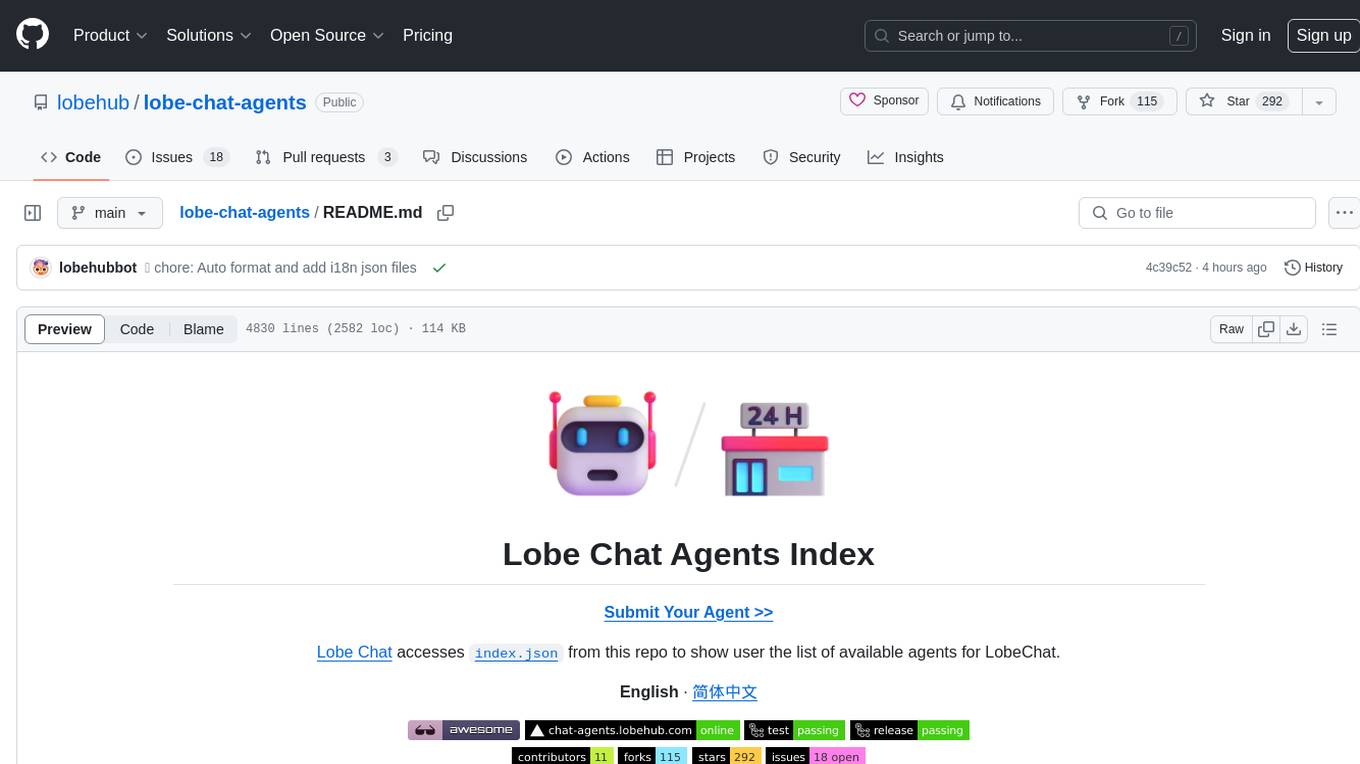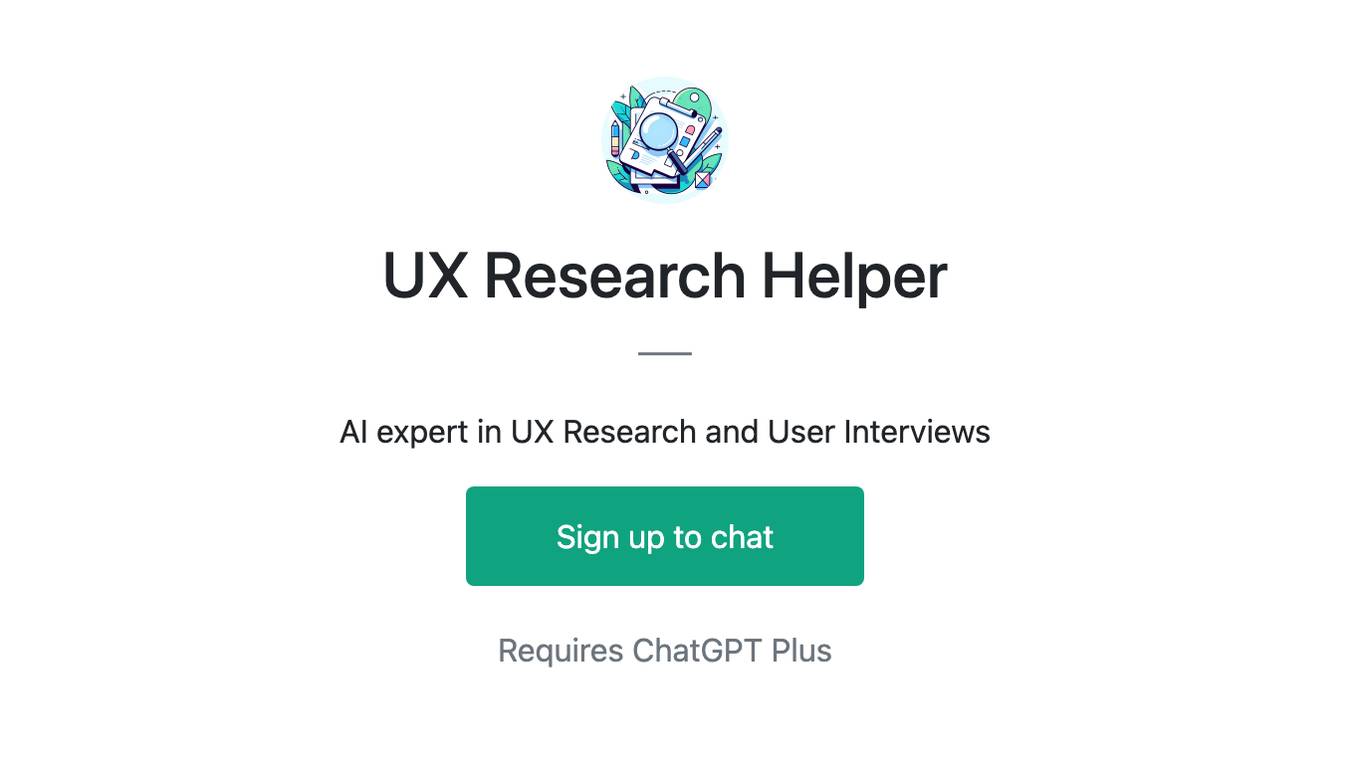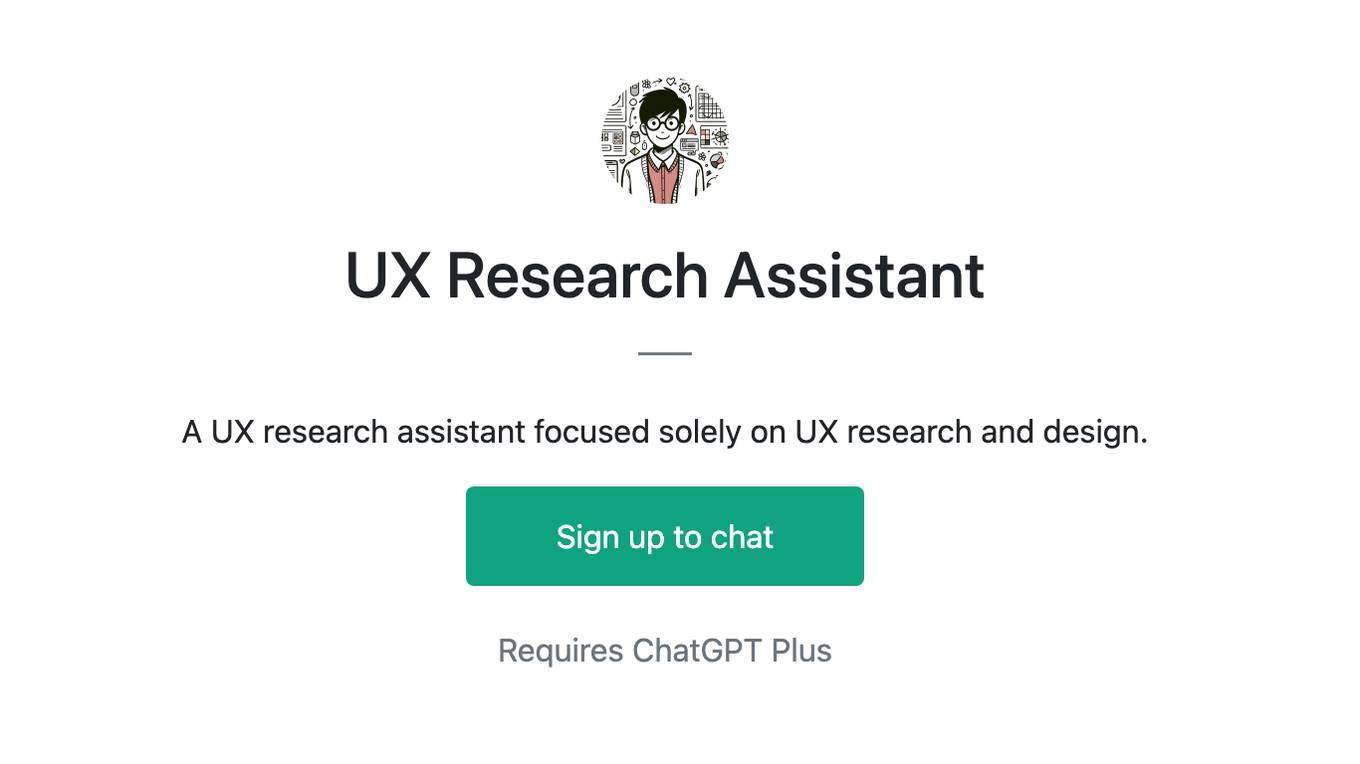Best AI tools for< conduct user tests >
20 - AI tool Sites
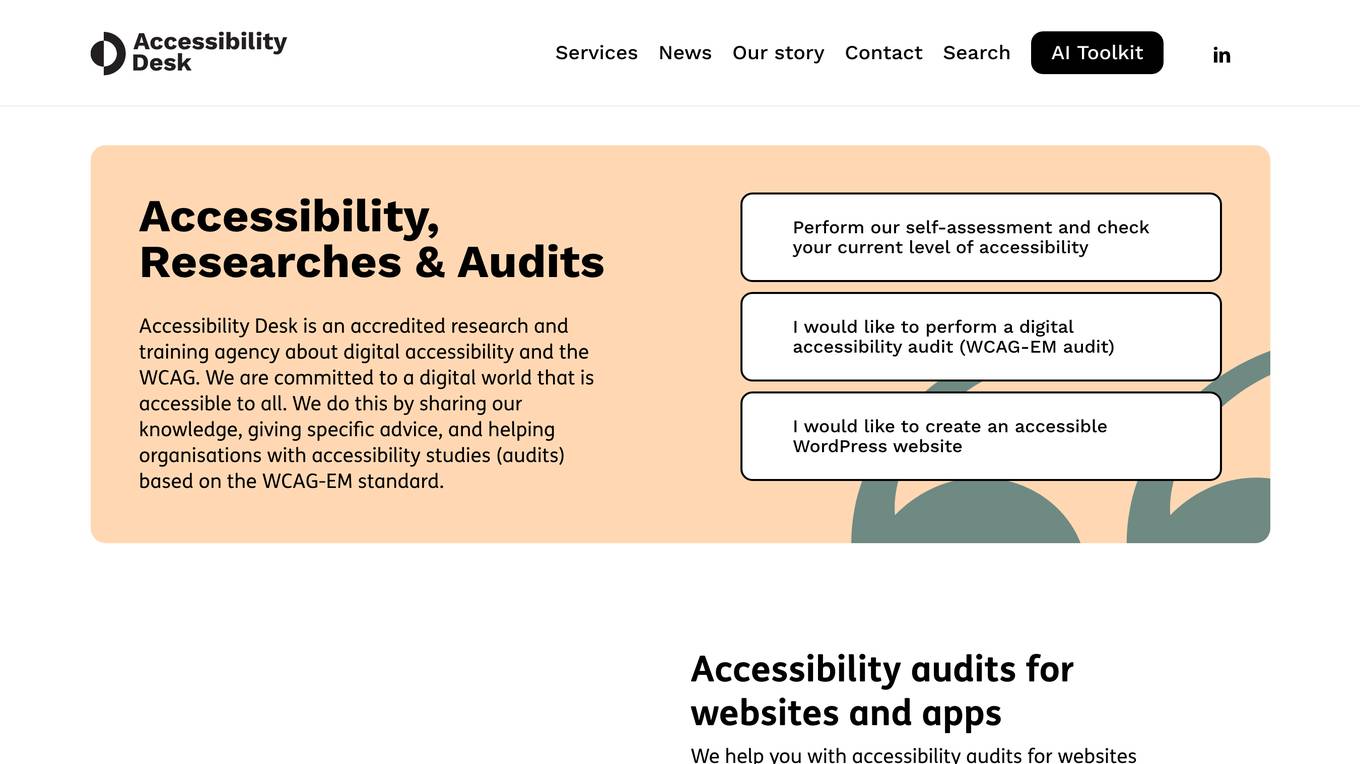
Accessibility Desk
Accessibility Desk is an accredited research and training agency specializing in digital accessibility and the WCAG. They provide services such as accessibility audits for websites and apps, self-assessment tools, and assistance in creating accessible WordPress websites. The organization aims to make a sustainable contribution to the accessibility of digital products by offering awareness training and conducting official accessibility tests based on the WCAG-EM standard.
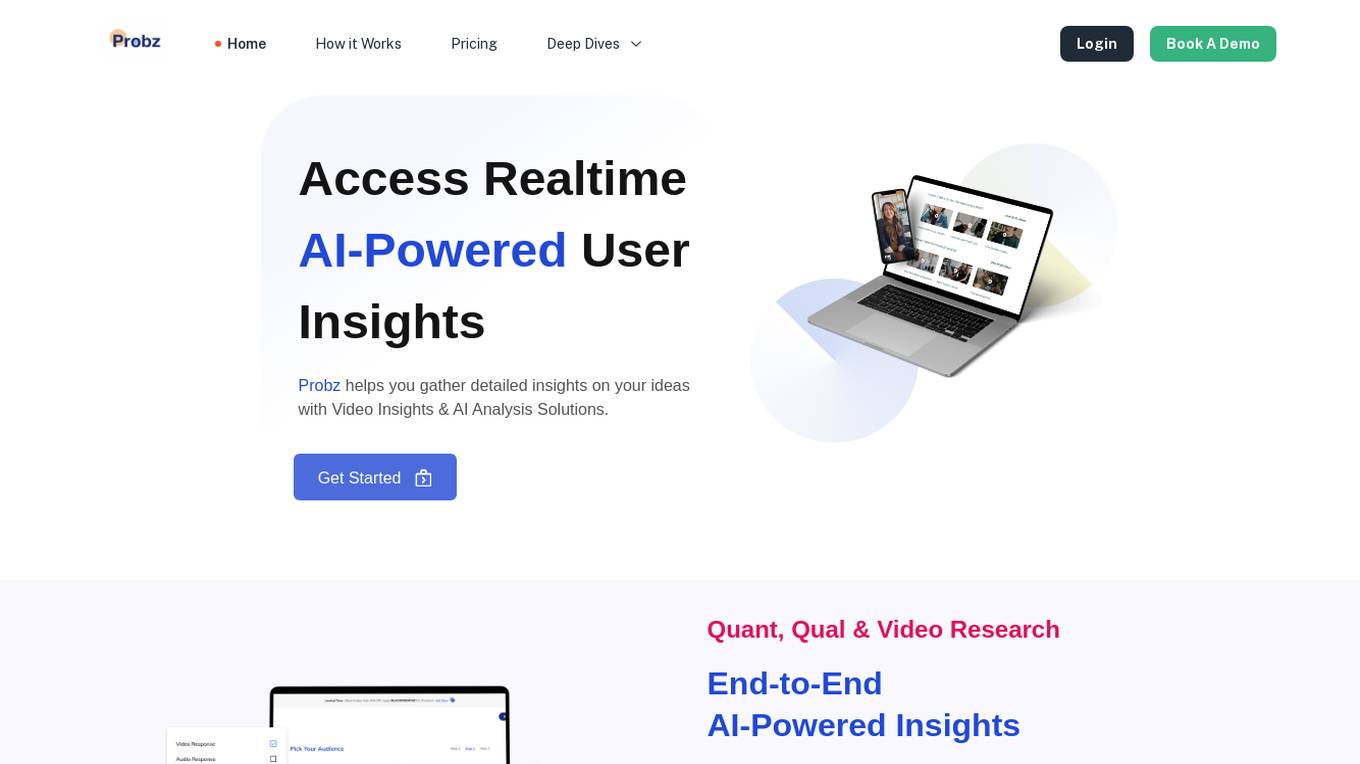
Probz
Probz is an AI-powered end-to-end Insights Platform that helps brands gather detailed insights on their ideas through Quant, Qual, and Video Research. With a panel of over 10 million users worldwide, Probz enables brands to supercharge their decision-making process, understand customer behavior, collect feedback for product development, optimize marketing strategies, explore new initiatives, and obtain feedback on technology preferences and designs. The platform offers AI-generated hypotheses, customizable surveys, and real-user tests to enhance sales, customer satisfaction, and brand loyalty.
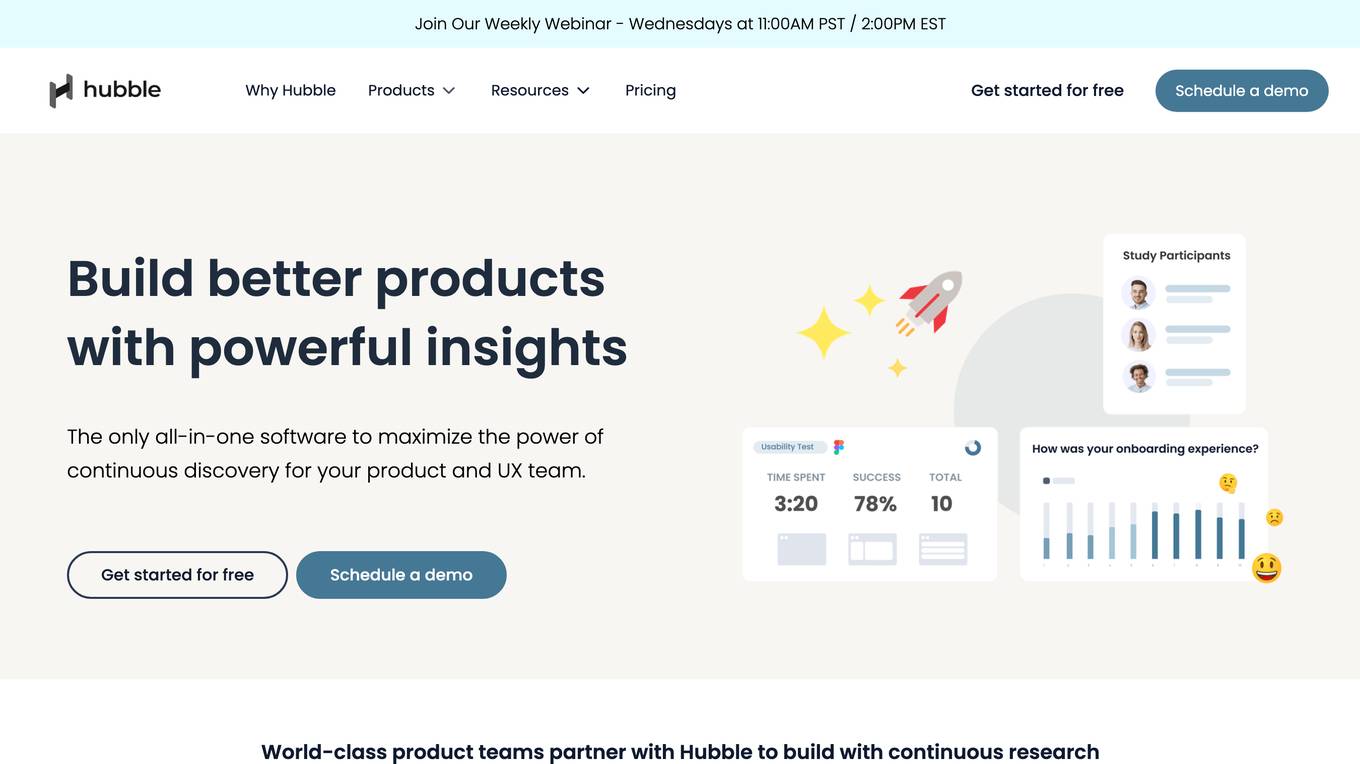
Hubble
Hubble is an all-in-one user research software that provides tools for continuous discovery, usability testing, prototype testing, user targeting, and more. It offers features such as in-product research, contextual surveys, participant recruitment, resources like guides and templates, and demo videos. Hubble empowers product teams to collect feedback from users, make informed decisions, and enhance product development cycles.

Intellimize
Intellimize is an AI-driven website optimization and personalization platform that empowers businesses to create, test, personalize, and optimize their websites with the help of artificial intelligence technology. The platform offers features such as AI-driven optimization, A/B testing, rules-based personalization, and generative AI for copy suggestions. Intellimize enables personalized website experiences for any marketing campaign, allowing users to deliver 1:1 personalization to every visitor without the need for first or third-party data. The platform helps businesses drive 1:1 personalization at every touchpoint, making every marketing dollar count with AI website optimization.
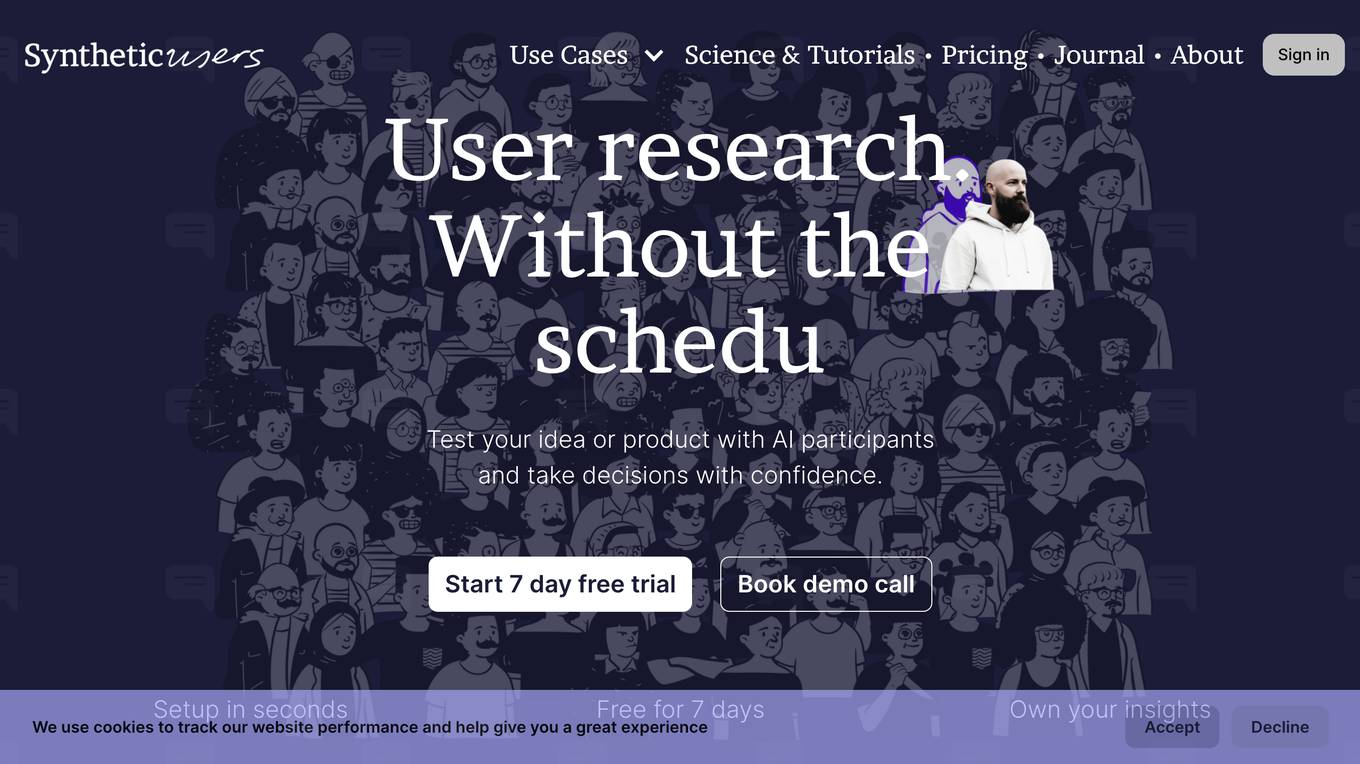
Synthetic Users
Synthetic Users is an AI-powered user research tool that allows users to conduct user research without the traditional challenges and headaches. The platform leverages advanced AI architecture to create accurate synthetic interviews and surveys, enabling users to gain valuable insights for various applications. Synthetic Users uses the power of Large Language Models (LLMs) to generate human-like AI participants with high Synthetic Organic Parity, ensuring relevant and reflective data. The tool offers a multi-agent architecture for dynamic interactions, continuous learning, and adaptation, mimicking real human behaviors. Users can run problem exploration interviews, concept testing interviews, and enrich their own Synthetic Users with proprietary data. With a focus on enhancing user satisfaction and identifying market needs, Synthetic Users provides a complete suite of research solutions for product discovery, marketing, and growth.
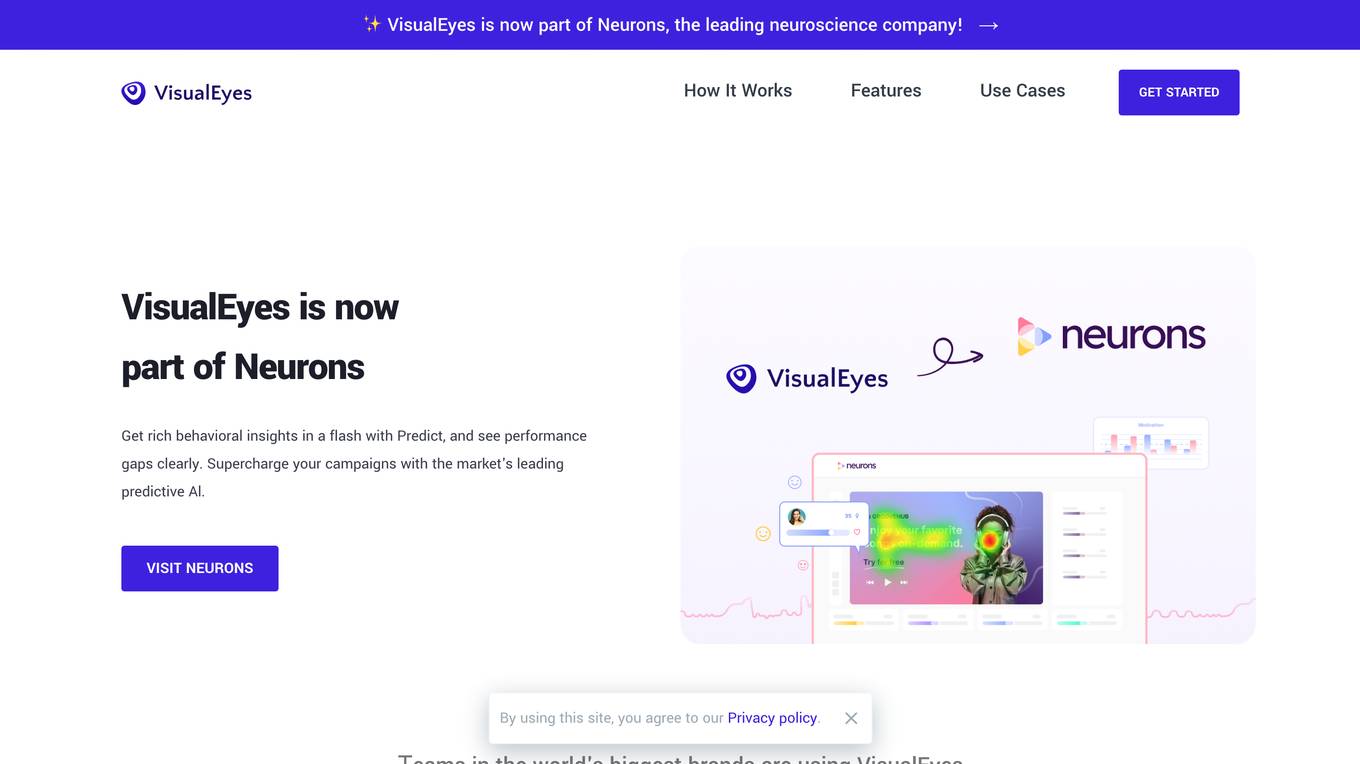
VisualEyes
VisualEyes is a user experience (UX) optimization tool that uses attention heatmaps and clarity scores to help businesses improve the effectiveness of their digital products. It provides insights into how users interact with websites and applications, allowing businesses to identify areas for improvement and make data-driven decisions about their designs. VisualEyes is part of Neurons, a leading neuroscience company that specializes in providing AI-powered solutions for businesses.
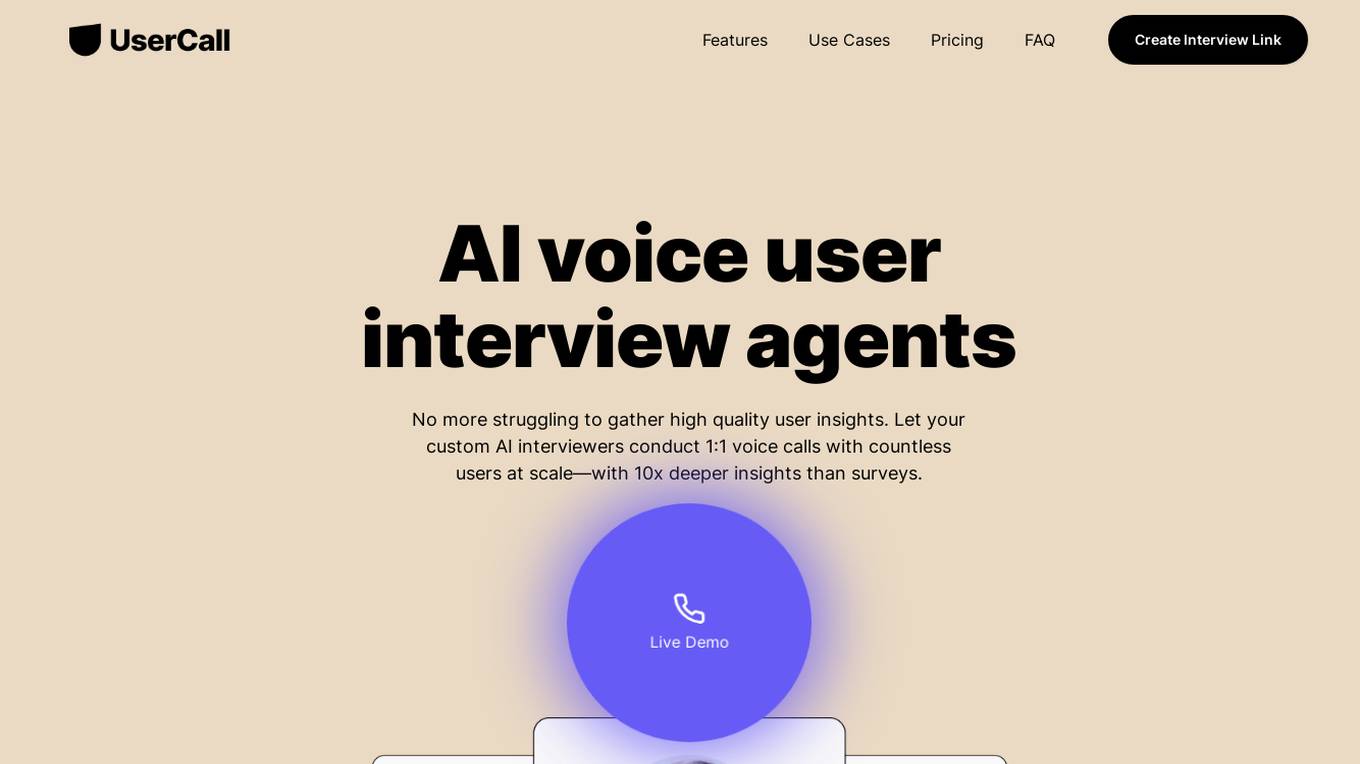
UserCall
UserCall is an AI-powered platform that enables users to conduct high-quality user interviews using custom AI interviewers. The platform offers deep insights through 1:1 voice calls with users, providing smart follow-up questions to uncover customer needs. UserCall saves time and effort by extracting key actionable insights from conversations, offering branded interview links, and facilitating continuous feedback, market research, participant screening, usability testing, and customer satisfaction analysis.
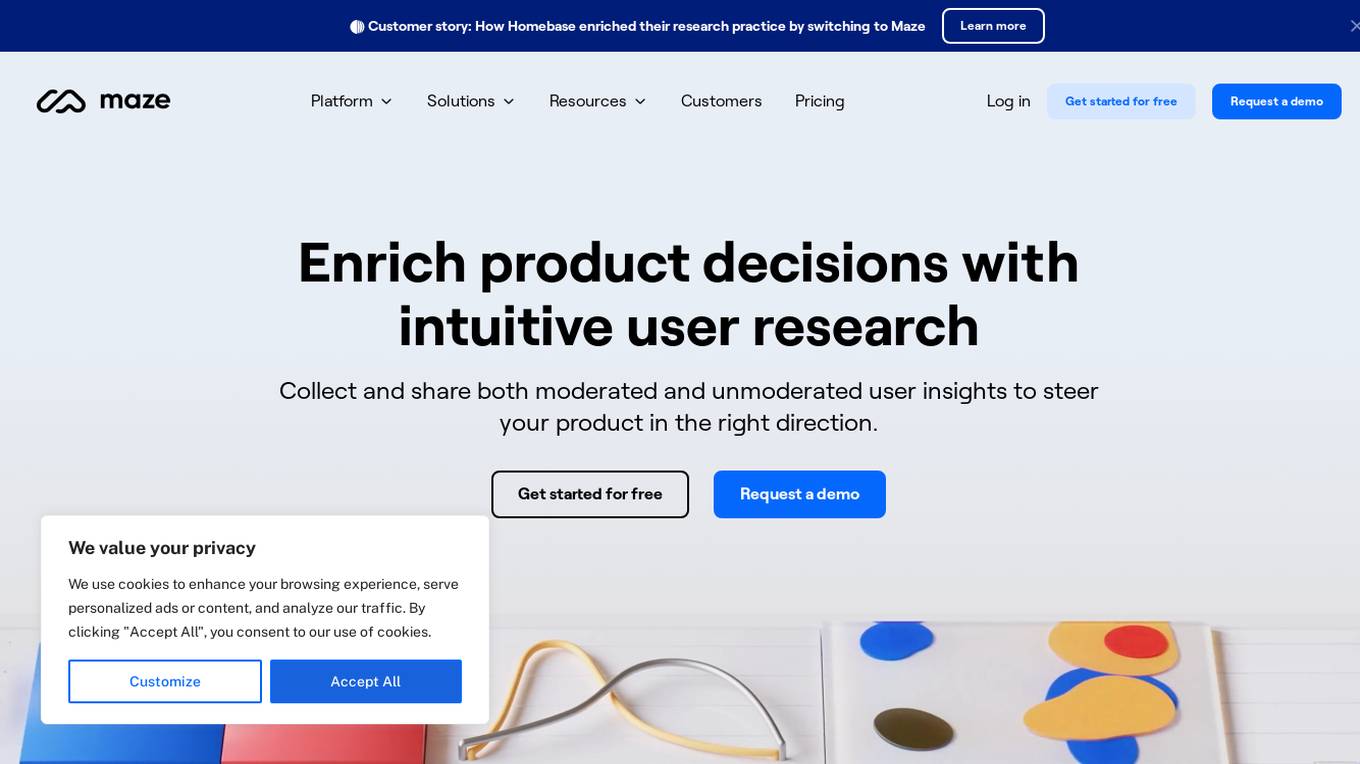
Maze
Maze is a continuous product discovery platform that enables users to enrich product decisions with intuitive user research. It offers a wide range of features such as prototype testing, website testing, surveys, interview studies, and more. With AI-powered tools and integrations with popular design tools, Maze helps users scale user insights and speed up product launches. The platform provides Enterprise-level protection, encrypted transmission, access control, data center security, GDPR compliance, SSO, and private workspaces to ensure data security and compliance. Trusted by companies of all industries and sizes, Maze empowers teams to make user-informed decisions and drive faster product iteration for a better user experience.

Re-VIEW
Re-VIEW is an AI-powered survey tool that allows users to collect video responses to survey questions, enabling them to see and hear what people think. The tool offers a free forever plan with the option to upgrade if needed. It provides the ability to capture authentic emotional connections through body language and voice intonation, leading to higher response rates and more detailed answers. With automatic insights and AI-driven analysis, users can conduct research at scale efficiently. Re-VIEW aims to simplify the survey process with stunning simplicity and practical pricing, making powerful research accessible to all.

Evolv AI
Evolv AI is an AI-led Experience Optimization platform that helps businesses improve their digital experiences through data-driven ideation, knowledge management, easy implementation, and experimentation. It uses generative AI to evaluate digital experiences, provide strategic opportunities for UX improvements, and continuously deliver performance-boosting recommendations. Evolv AI allows users to train the AI with specific business information, adheres to brand guidelines, and helps streamline resource allocation. The platform interprets design and content ideas to produce production-ready code for website testing. It leverages AI and machine learning to create and improve personalized experiences across multiple touchpoints in real-time.
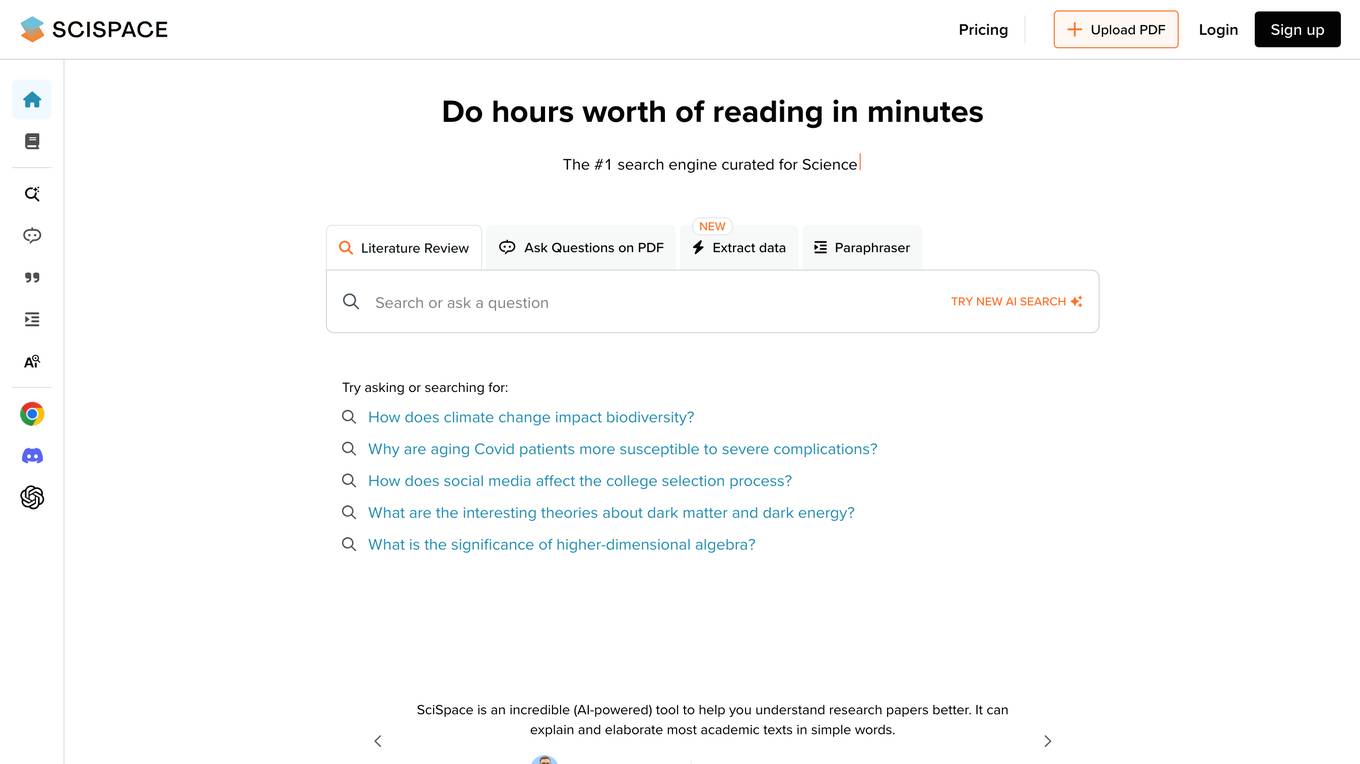
SciSpace
SciSpace is an AI-powered tool that helps researchers understand research papers better. It can explain and elaborate most academic texts in simple words. It is a great tool for students, researchers, and anyone who wants to learn more about a particular topic. SciSpace has a user-friendly interface and is easy to use. Simply upload a research paper or enter a URL, and SciSpace will do the rest. It will highlight key concepts, provide definitions, and generate a summary of the paper. SciSpace can also be used to generate citations and find related papers.
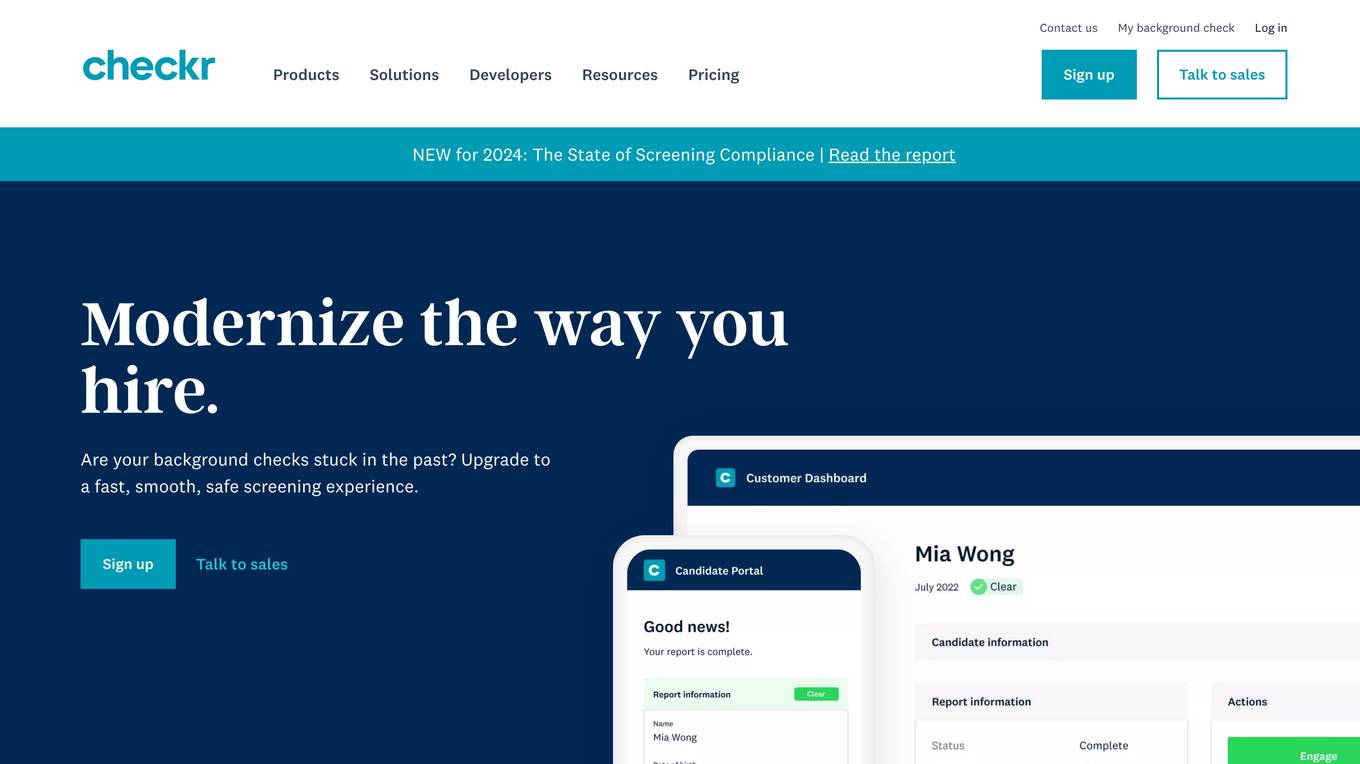
Checkr
Checkr is a comprehensive employee background screening platform for companies, offering services such as criminal background checks, employment verification, driving record checks, drug testing, education verification, and more. The platform is designed to streamline the hiring process, providing fast and accurate results to help businesses make informed decisions when evaluating potential candidates. Checkr also focuses on fair chance hiring practices, aiming to support individuals with criminal records in finding employment opportunities. With a user-friendly interface and a range of integrations, Checkr is a trusted solution for over 100,000 customers looking to modernize their background check processes.

FusionOS.ai
FusionOS.ai is an AI Generative Advertising platform designed for businesses and their agencies. It offers a user-friendly interface that allows users to generate and publish professional ads in seconds without the need for marketing experience. The platform leverages Generative AI to create omni-content with just one click and automatically conducts A/B tests to ensure optimal results. FusionOS.ai covers various advertising channels such as social media posts, paid ads, emails, and SMS, making it a comprehensive solution for marketing needs.

UX Tigers
UX Tigers is a website that provides user experience insights and articles from Jakob Nielsen. The website covers a wide range of UX topics, including user research, design, and usability. UX Tigers also offers a variety of resources, such as templates and tools, to help UX professionals improve their work.

UXSquid
UXSquid is a comprehensive UX research software platform and tool that guides users through the user research process with interview question examples, plans, templates, and a cheat sheet. It offers a free trial, requires no credit card, and allows users to cancel anytime. UXSquid's platform makes it easy to conduct user interviews and gather feedback. Users can use its automation tools to set up interviews with their target audience and gather valuable information. UXSquid analyzes user experiences and interactions with a company using cutting-edge artificial intelligence. It then makes important suggestions and enhancements to improve a product for its users.
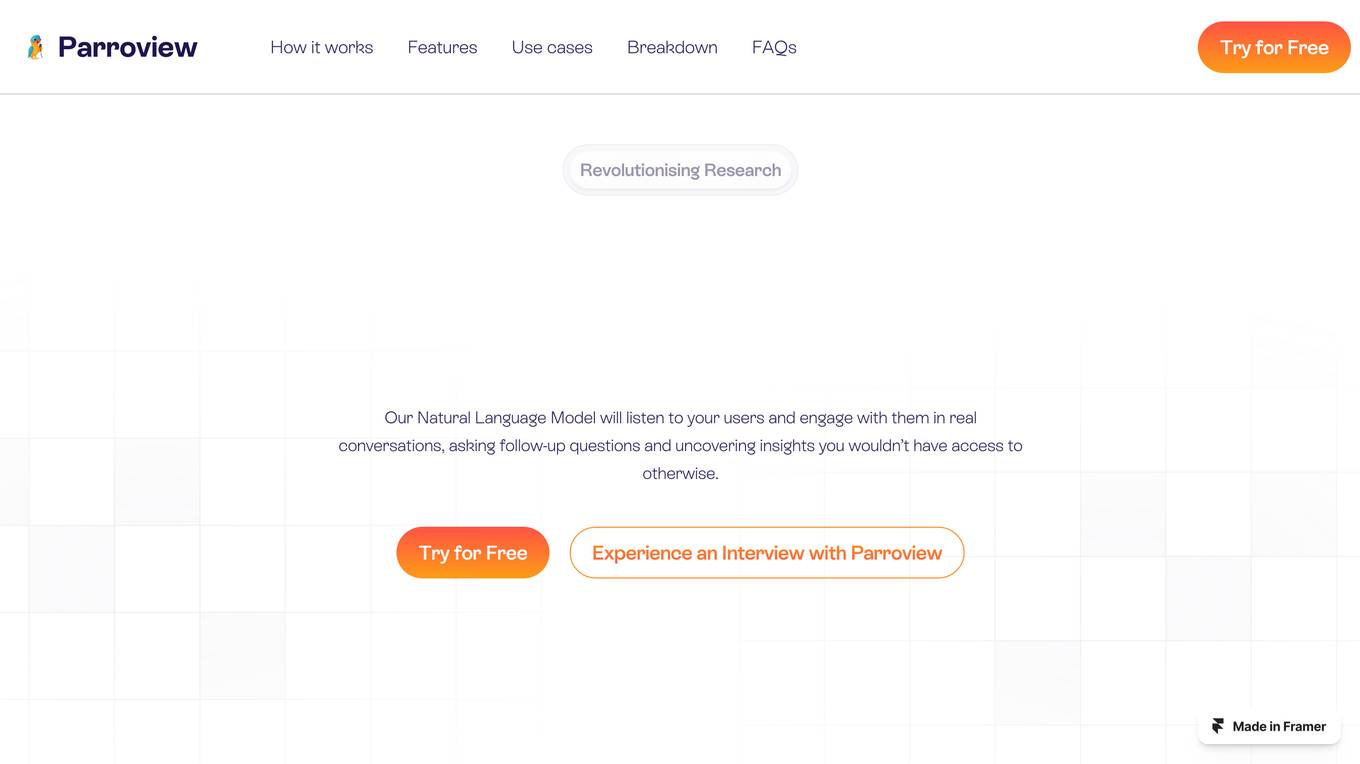
Parroview
Parroview is a revolutionary AI-powered user research platform that automates the process of conducting user interviews. It uses natural language processing (NLP) to engage with users in real-time conversations, asking follow-up questions and uncovering insights that would be difficult to obtain through traditional methods. Parroview is designed to be fully autonomous, allowing researchers to set up interviews and gather insights without the need for manual intervention. It supports multiple languages, making it accessible to a global audience. Parroview offers a range of features, including the ability to conduct interviews via text or voice, analyze insights in real-time, and generate detailed transcripts. It is suitable for a wide range of research needs, including product validation, consumer behavior analysis, post-purchase evaluations, brand perception studies, and customer persona development.

heardeer
heardeer is an AI-powered user interview platform that helps businesses collect valuable feedback from their users. With heardeer, you can create custom interview questionnaires, share them with your users, and let AI manage the interviews. heardeer's AI engine will ask your users questions, follow up on their answers, and provide you with detailed insights into their feedback. This can help you understand your users' needs, improve your products and services, and make better decisions.
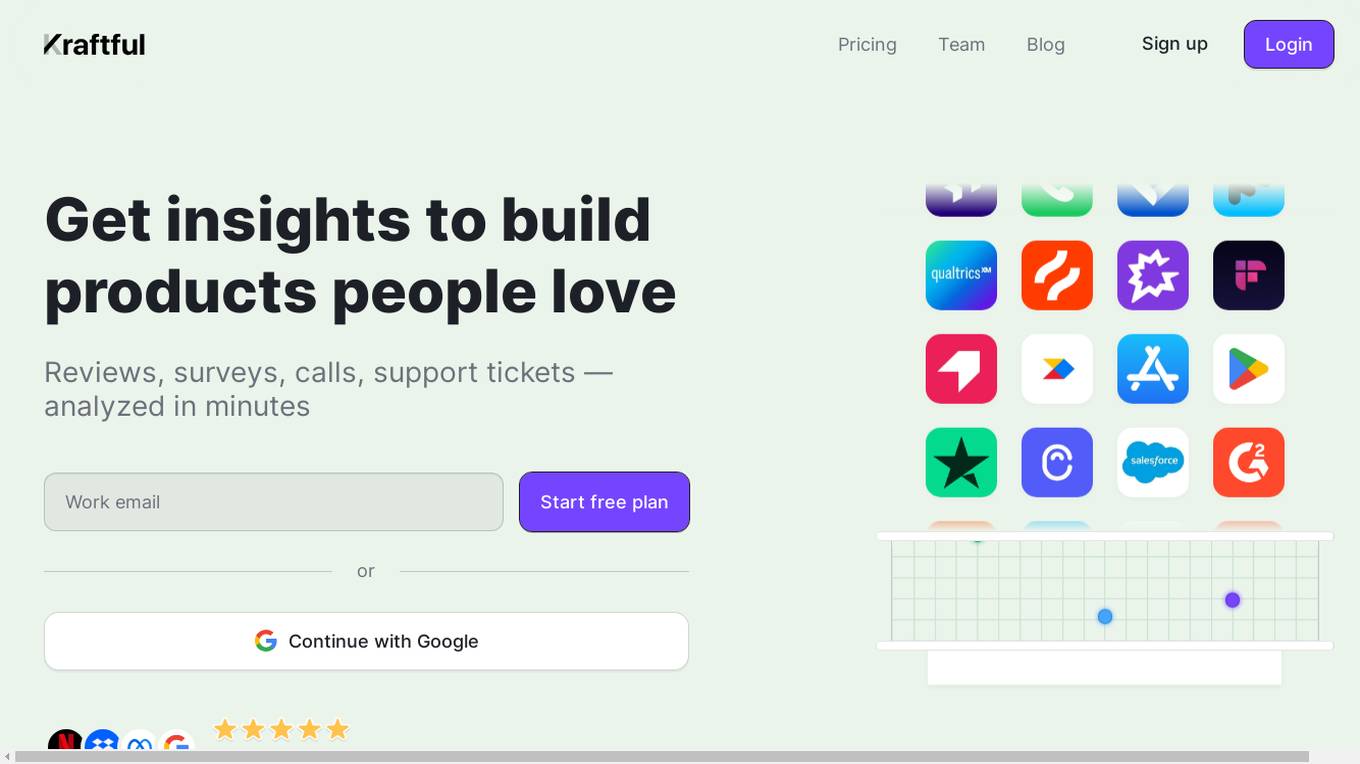
Kraftful
Kraftful is an AI-powered platform designed for product builders to collect, analyze, and act on user feedback efficiently. It offers features such as sentiment analysis, auto-organizing insights into projects, generating surveys, AI-powered user interviews, and feedback translation. Kraftful helps product teams save time by automating tasks like crafting user surveys, analyzing feedback, and generating user stories. The platform aims to provide actionable product insights by turning volumes of user feedback into valuable information for product development.
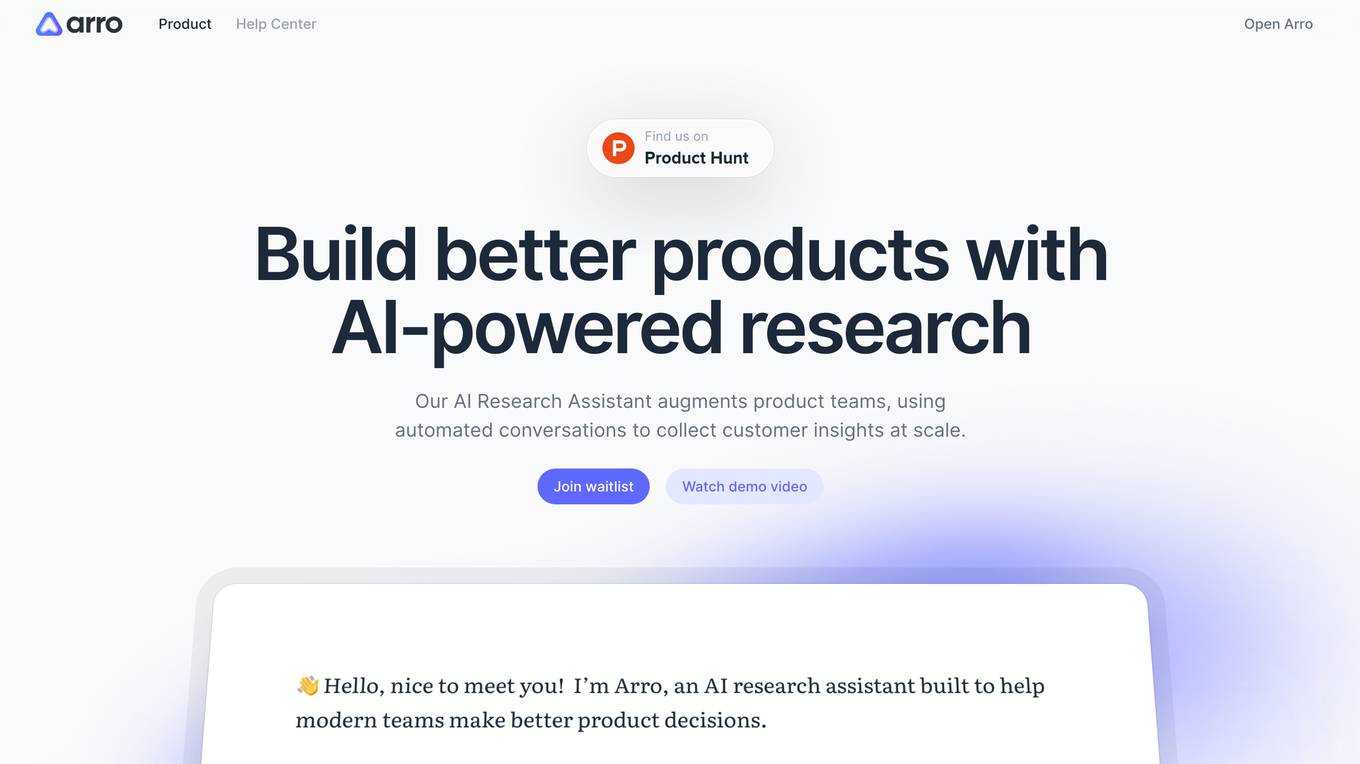
Arro
Arro is an AI-powered research assistant that helps product teams collect customer insights at scale. It uses automated conversations to conduct user interviews with thousands of customers simultaneously, generating product opportunities that can be directly integrated into the product roadmap. Arro's innovative AI-led methodology combines the depth of user interviews with the speed and scale of surveys, enabling product teams to gain a comprehensive understanding of their customers' needs and preferences.
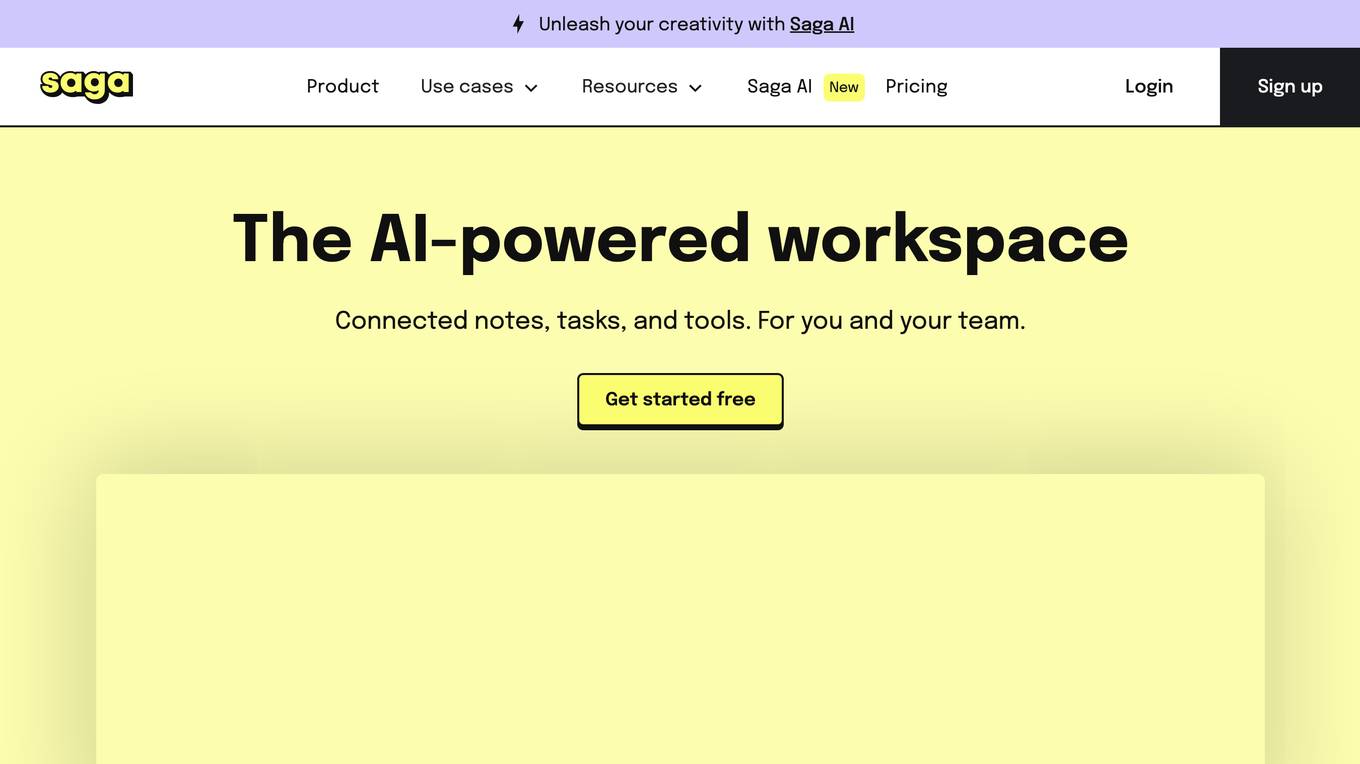
Saga
Saga is an AI-powered workspace that combines notes, tasks, and tools to enhance creativity and productivity. It offers a clutter-free workspace for writing, editing, and sharing notes and documents, along with a smart AI assistant that provides writing assistance, answers questions, generates content, and aids in brainstorming. Saga also seamlessly integrates task management, allowing users to manage all their tasks from one place. Additionally, it connects knowledge and resurfaces relevant information when needed, enabling users to quickly search content, link pages, and discover hidden connections. Saga is designed to simplify and enhance workflows for individuals and teams in various domains, including meeting notes, product management, UX research, documentation, remote work, knowledge management, studying, HR, and recruiting.
20 - Open Source AI Tools
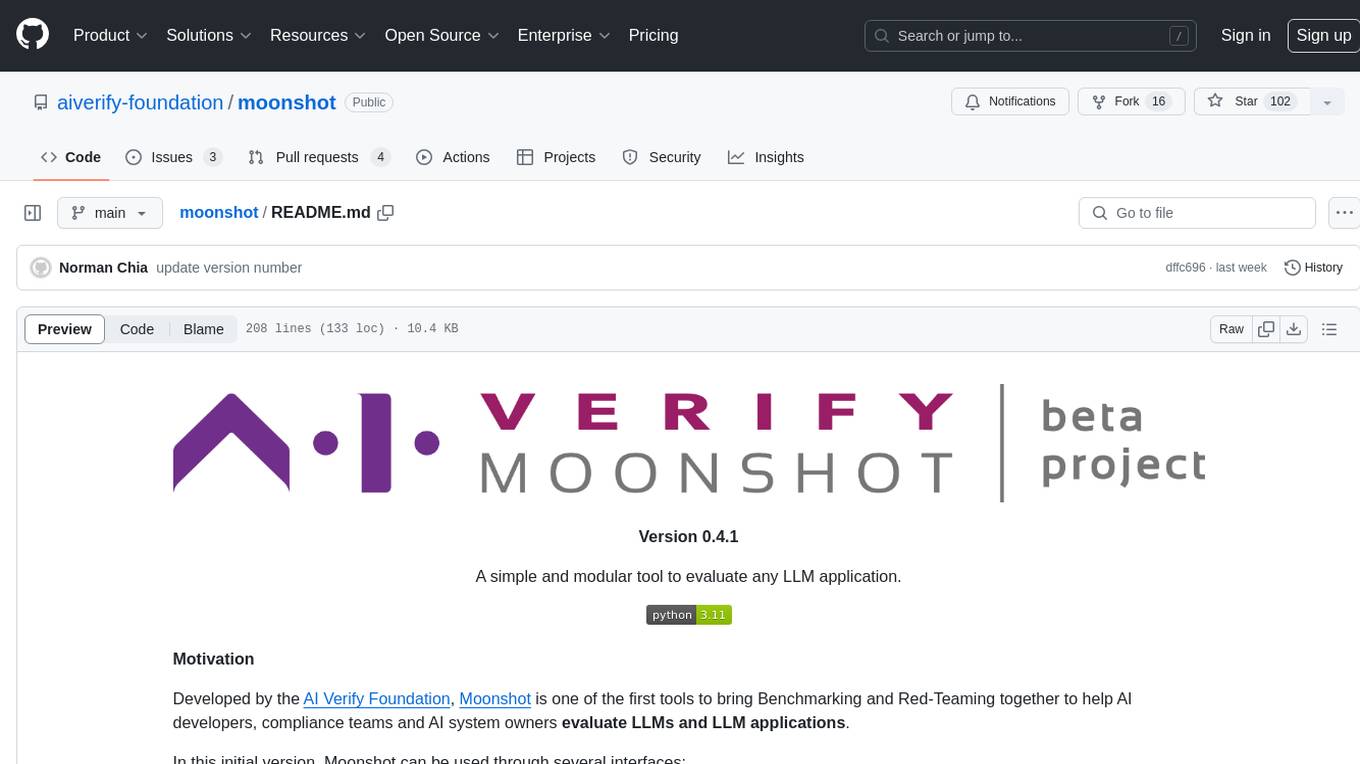
moonshot
Moonshot is a simple and modular tool developed by the AI Verify Foundation to evaluate Language Model Models (LLMs) and LLM applications. It brings Benchmarking and Red-Teaming together to assist AI developers, compliance teams, and AI system owners in assessing LLM performance. Moonshot can be accessed through various interfaces including User-friendly Web UI, Interactive Command Line Interface, and seamless integration into MLOps workflows via Library APIs or Web APIs. It offers features like benchmarking LLMs from popular model providers, running relevant tests, creating custom cookbooks and recipes, and automating Red Teaming to identify vulnerabilities in AI systems.
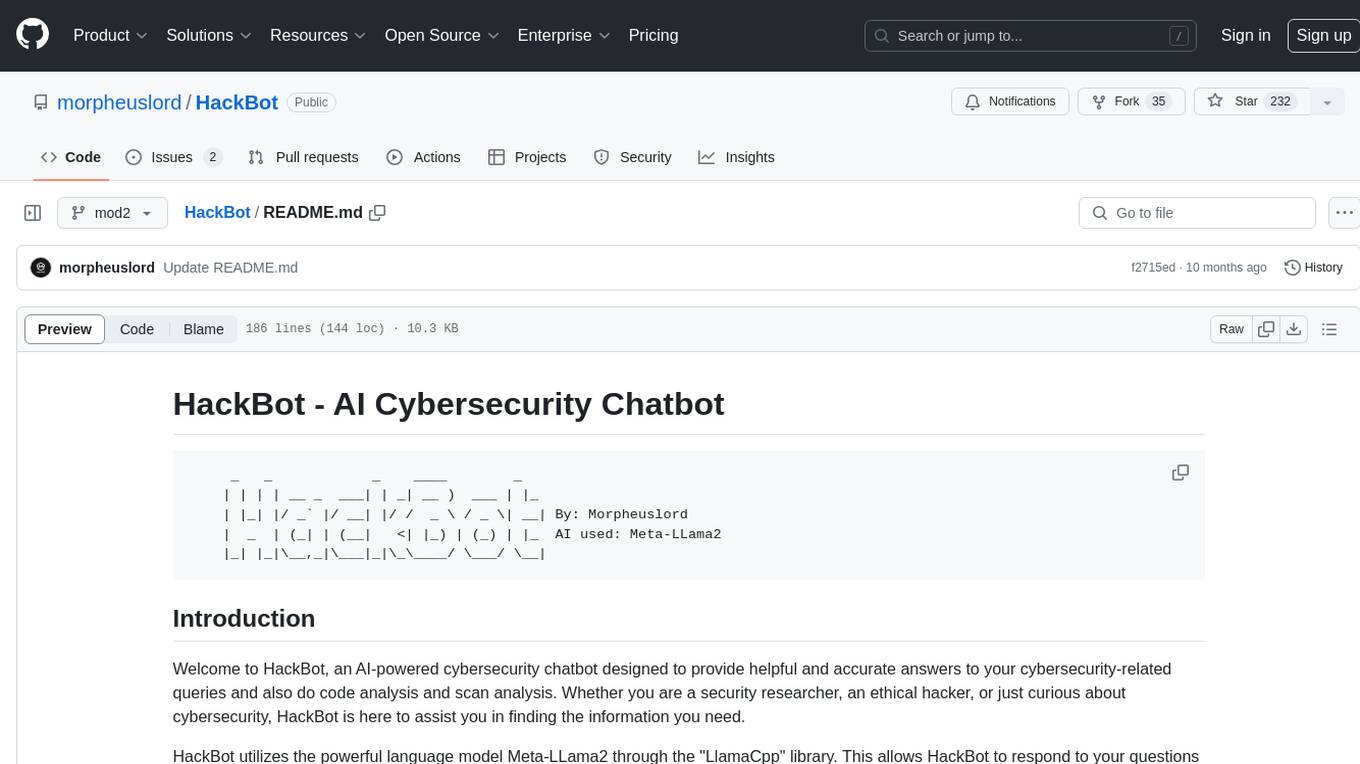
HackBot
HackBot is an AI-powered cybersecurity chatbot designed to provide accurate answers to cybersecurity-related queries, conduct code analysis, and scan analysis. It utilizes the Meta-LLama2 AI model through the 'LlamaCpp' library to respond coherently. The chatbot offers features like local AI/Runpod deployment support, cybersecurity chat assistance, interactive interface, clear output presentation, static code analysis, and vulnerability analysis. Users can interact with HackBot through a command-line interface and utilize it for various cybersecurity tasks.
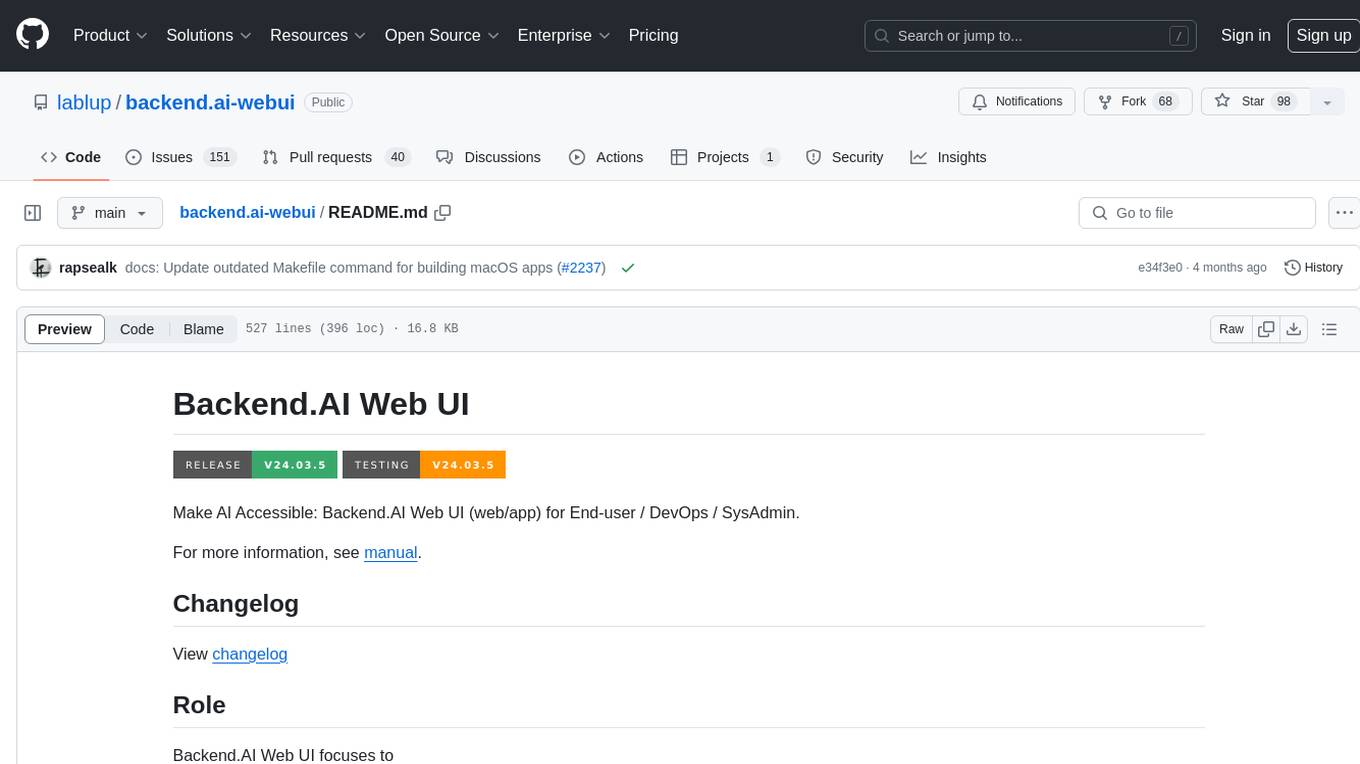
backend.ai-webui
Backend.AI Web UI is a user-friendly web and app interface designed to make AI accessible for end-users, DevOps, and SysAdmins. It provides features for session management, inference service management, pipeline management, storage management, node management, statistics, configurations, license checking, plugins, help & manuals, kernel management, user management, keypair management, manager settings, proxy mode support, service information, and integration with the Backend.AI Web Server. The tool supports various devices, offers a built-in websocket proxy feature, and allows for versatile usage across different platforms. Users can easily manage resources, run environment-supported apps, access a web-based terminal, use Visual Studio Code editor, manage experiments, set up autoscaling, manage pipelines, handle storage, monitor nodes, view statistics, configure settings, and more.

rag-experiment-accelerator
The RAG Experiment Accelerator is a versatile tool that helps you conduct experiments and evaluations using Azure AI Search and RAG pattern. It offers a rich set of features, including experiment setup, integration with Azure AI Search, Azure Machine Learning, MLFlow, and Azure OpenAI, multiple document chunking strategies, query generation, multiple search types, sub-querying, re-ranking, metrics and evaluation, report generation, and multi-lingual support. The tool is designed to make it easier and faster to run experiments and evaluations of search queries and quality of response from OpenAI, and is useful for researchers, data scientists, and developers who want to test the performance of different search and OpenAI related hyperparameters, compare the effectiveness of various search strategies, fine-tune and optimize parameters, find the best combination of hyperparameters, and generate detailed reports and visualizations from experiment results.
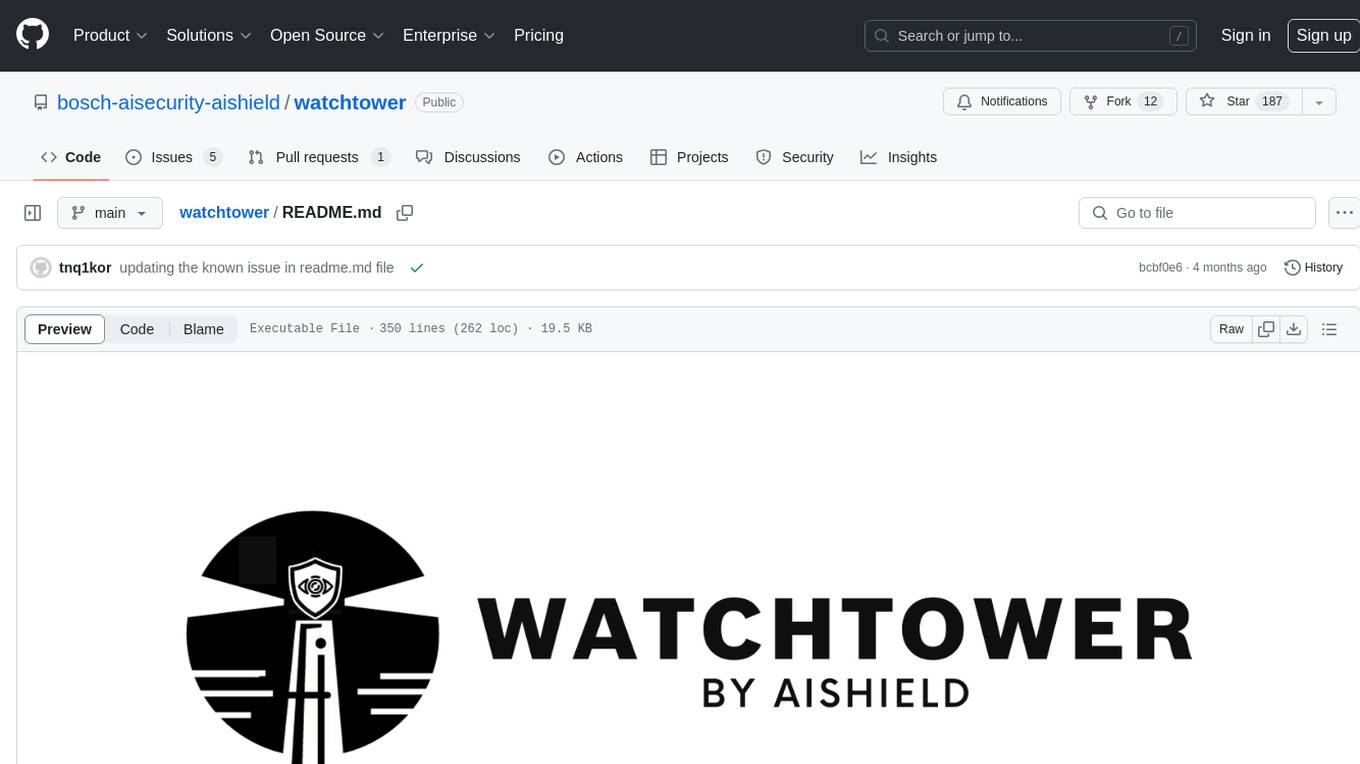
watchtower
AIShield Watchtower is a tool designed to fortify the security of AI/ML models and Jupyter notebooks by automating model and notebook discoveries, conducting vulnerability scans, and categorizing risks into 'low,' 'medium,' 'high,' and 'critical' levels. It supports scanning of public GitHub repositories, Hugging Face repositories, AWS S3 buckets, and local systems. The tool generates comprehensive reports, offers a user-friendly interface, and aligns with industry standards like OWASP, MITRE, and CWE. It aims to address the security blind spots surrounding Jupyter notebooks and AI models, providing organizations with a tailored approach to enhancing their security efforts.
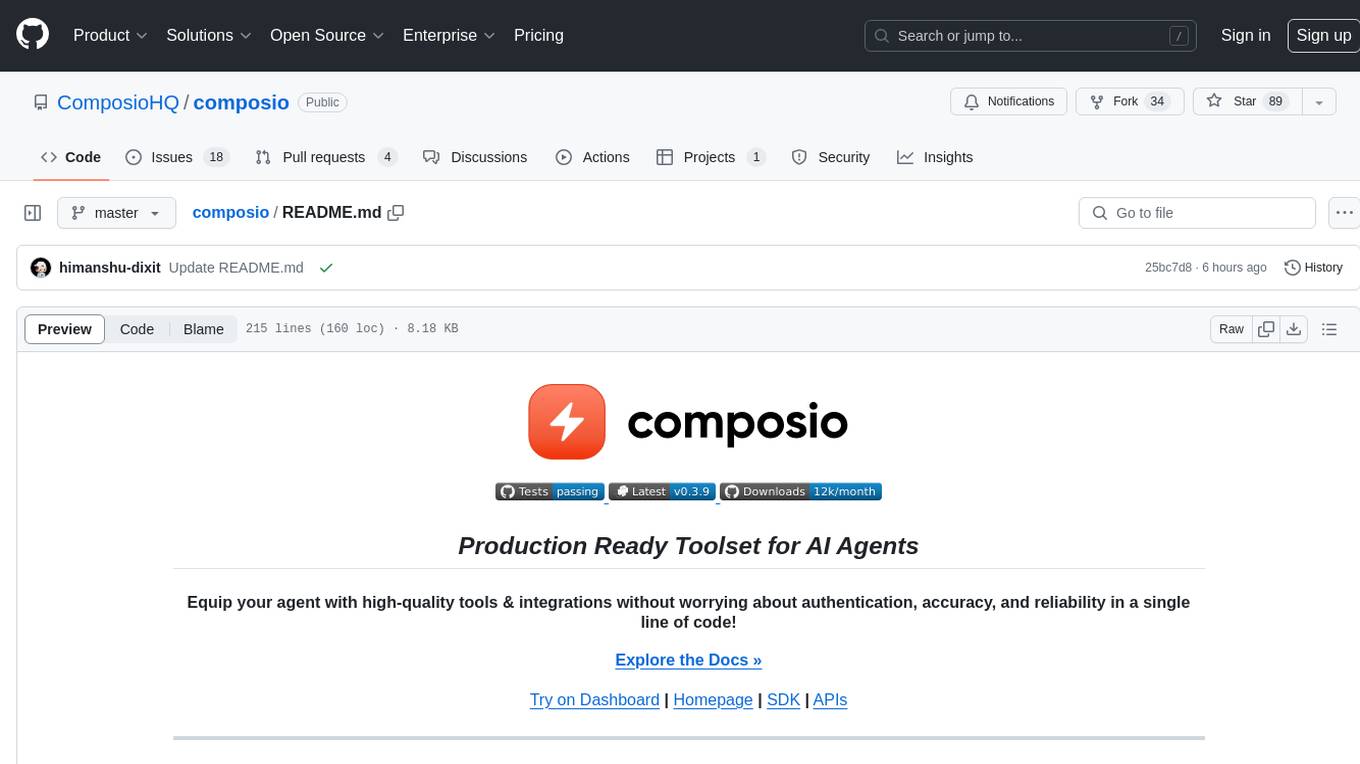
composio
Composio is a production-ready toolset for AI agents that enables users to integrate AI agents with various agentic tools effortlessly. It provides support for over 100 tools across different categories, including popular softwares like GitHub, Notion, Linear, Gmail, Slack, and more. Composio ensures managed authorization with support for six different authentication protocols, offering better agentic accuracy and ease of use. Users can easily extend Composio with additional tools, frameworks, and authorization protocols. The toolset is designed to be embeddable and pluggable, allowing for seamless integration and consistent user experience.
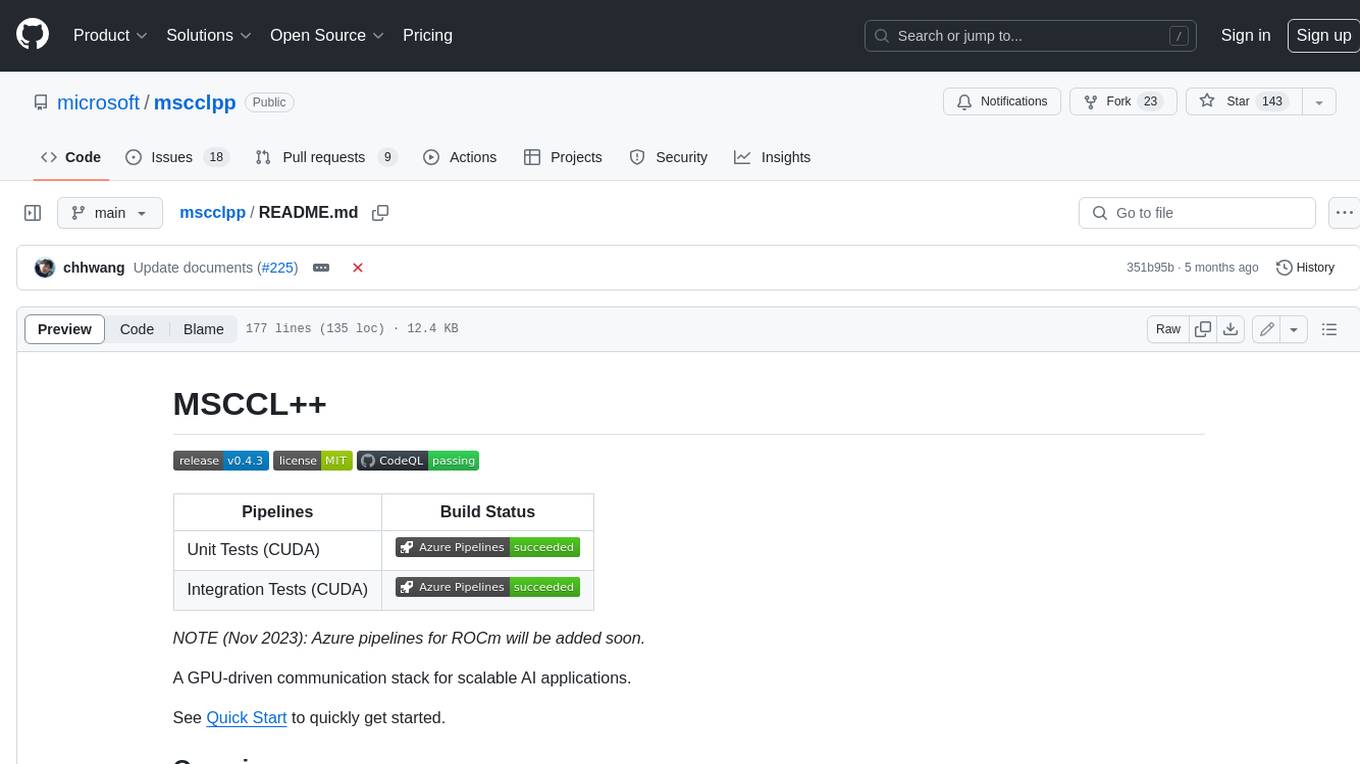
mscclpp
MSCCL++ is a GPU-driven communication stack for scalable AI applications. It provides a highly efficient and customizable communication stack for distributed GPU applications. MSCCL++ redefines inter-GPU communication interfaces, delivering a highly efficient and customizable communication stack for distributed GPU applications. Its design is specifically tailored to accommodate diverse performance optimization scenarios often encountered in state-of-the-art AI applications. MSCCL++ provides communication abstractions at the lowest level close to hardware and at the highest level close to application API. The lowest level of abstraction is ultra light weight which enables a user to implement logics of data movement for a collective operation such as AllReduce inside a GPU kernel extremely efficiently without worrying about memory ordering of different ops. The modularity of MSCCL++ enables a user to construct the building blocks of MSCCL++ in a high level abstraction in Python and feed them to a CUDA kernel in order to facilitate the user's productivity. MSCCL++ provides fine-grained synchronous and asynchronous 0-copy 1-sided abstracts for communication primitives such as `put()`, `get()`, `signal()`, `flush()`, and `wait()`. The 1-sided abstractions allows a user to asynchronously `put()` their data on the remote GPU as soon as it is ready without requiring the remote side to issue any receive instruction. This enables users to easily implement flexible communication logics, such as overlapping communication with computation, or implementing customized collective communication algorithms without worrying about potential deadlocks. Additionally, the 0-copy capability enables MSCCL++ to directly transfer data between user's buffers without using intermediate internal buffers which saves GPU bandwidth and memory capacity. MSCCL++ provides consistent abstractions regardless of the location of the remote GPU (either on the local node or on a remote node) or the underlying link (either NVLink/xGMI or InfiniBand). This simplifies the code for inter-GPU communication, which is often complex due to memory ordering of GPU/CPU read/writes and therefore, is error-prone.
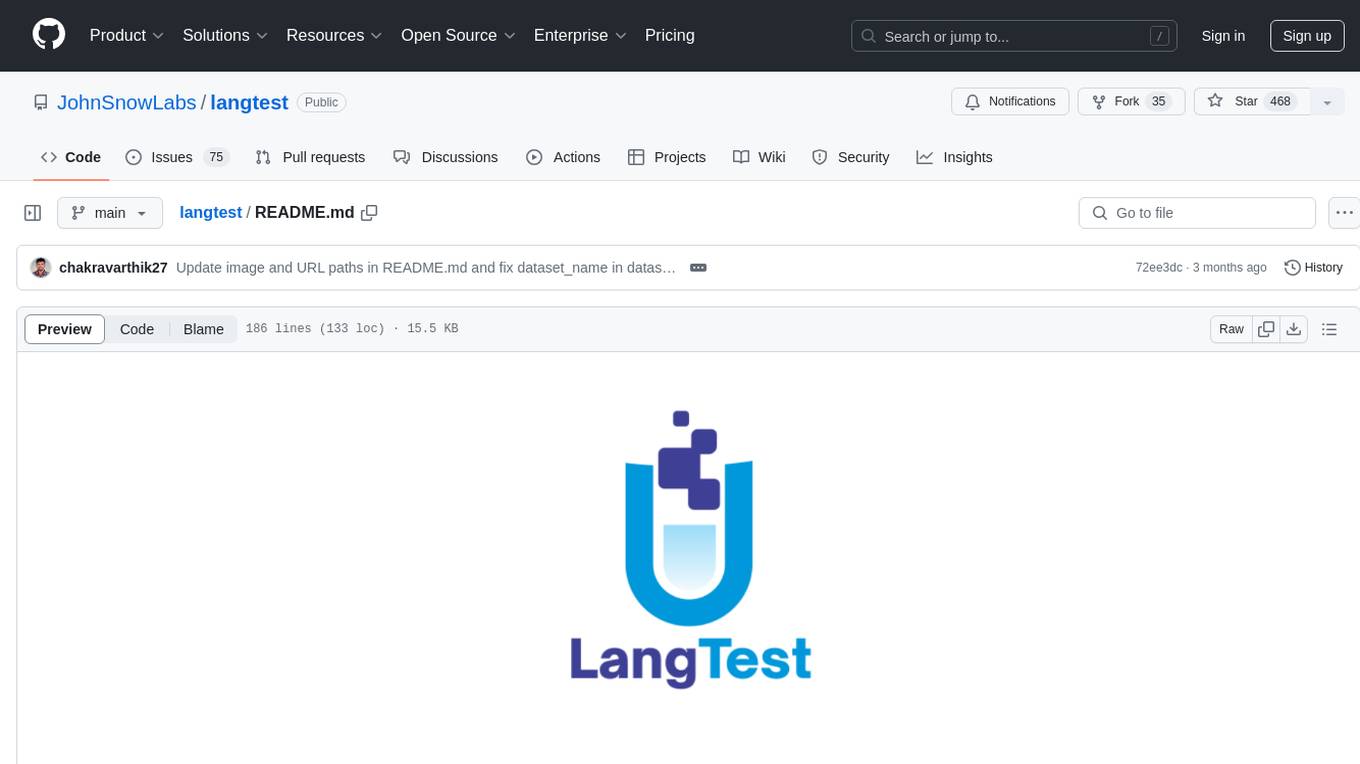
langtest
LangTest is a comprehensive evaluation library for custom LLM and NLP models. It aims to deliver safe and effective language models by providing tools to test model quality, augment training data, and support popular NLP frameworks. LangTest comes with benchmark datasets to challenge and enhance language models, ensuring peak performance in various linguistic tasks. The tool offers more than 60 distinct types of tests with just one line of code, covering aspects like robustness, bias, representation, fairness, and accuracy. It supports testing LLMS for question answering, toxicity, clinical tests, legal support, factuality, sycophancy, and summarization.
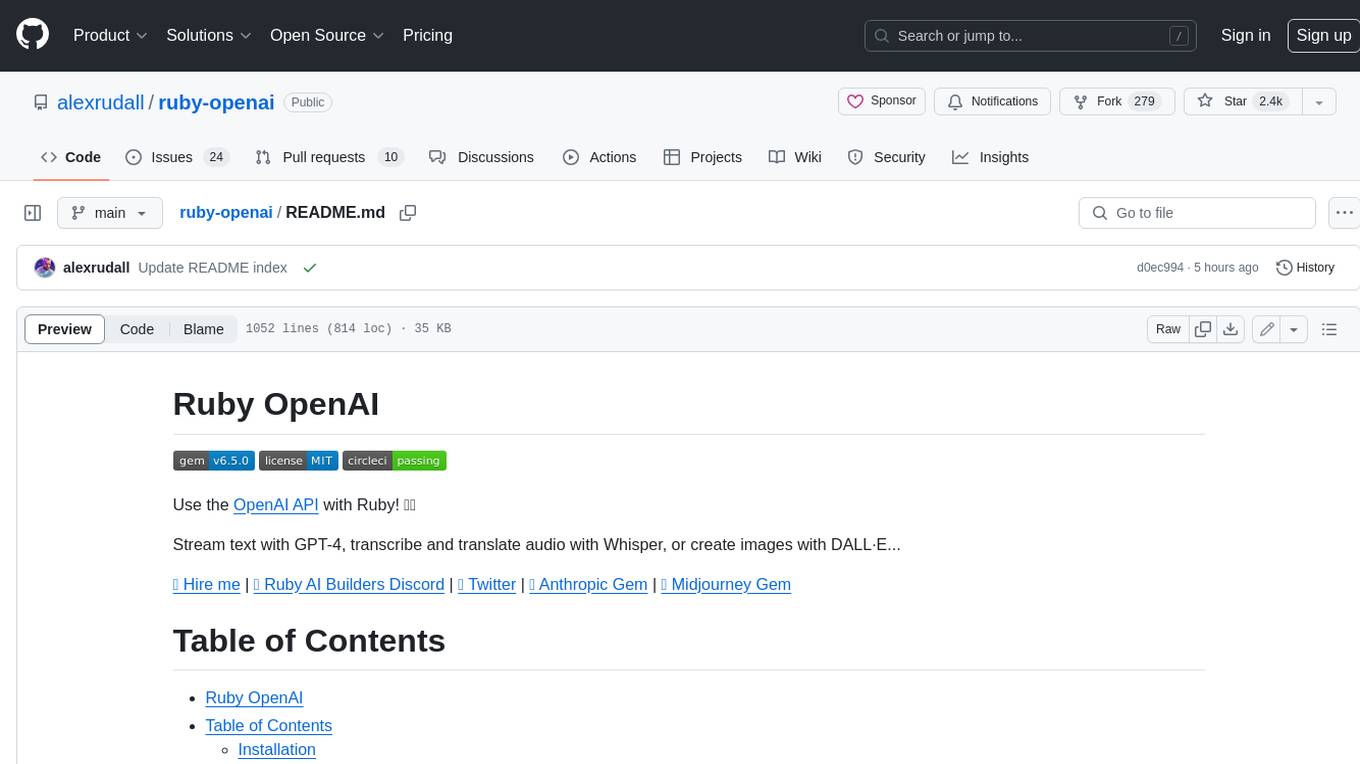
ruby-openai
Use the OpenAI API with Ruby! 🤖🩵 Stream text with GPT-4, transcribe and translate audio with Whisper, or create images with DALL·E... Hire me | 🎮 Ruby AI Builders Discord | 🐦 Twitter | 🧠 Anthropic Gem | 🚂 Midjourney Gem ## Table of Contents * Ruby OpenAI * Table of Contents * Installation * Bundler * Gem install * Usage * Quickstart * With Config * Custom timeout or base URI * Extra Headers per Client * Logging * Errors * Faraday middleware * Azure * Ollama * Counting Tokens * Models * Examples * Chat * Streaming Chat * Vision * JSON Mode * Functions * Edits * Embeddings * Batches * Files * Finetunes * Assistants * Threads and Messages * Runs * Runs involving function tools * Image Generation * DALL·E 2 * DALL·E 3 * Image Edit * Image Variations * Moderations * Whisper * Translate * Transcribe * Speech * Errors * Development * Release * Contributing * License * Code of Conduct
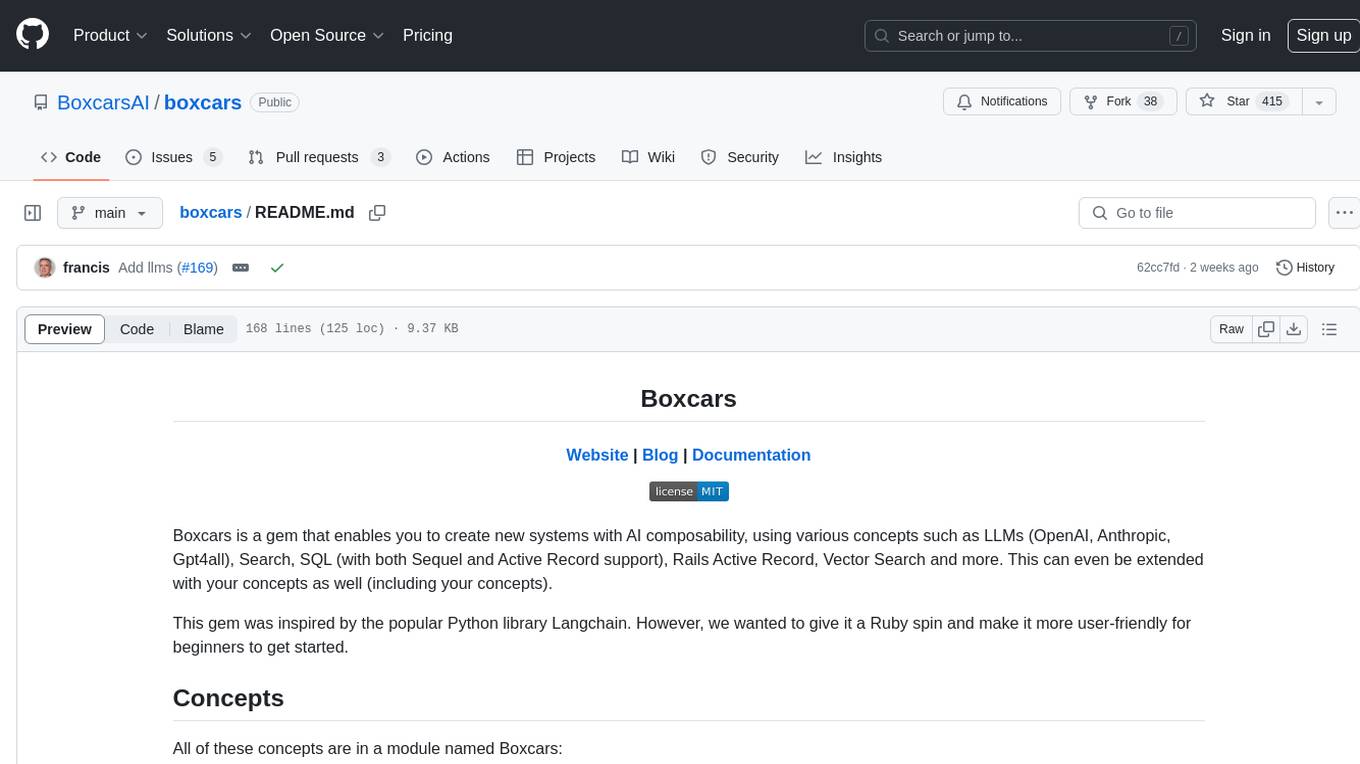
boxcars
Boxcars is a Ruby gem that enables users to create new systems with AI composability, incorporating concepts such as LLMs, Search, SQL, Rails Active Record, Vector Search, and more. It allows users to work with Boxcars, Trains, Prompts, Engines, and VectorStores to solve problems and generate text results. The gem is designed to be user-friendly for beginners and can be extended with custom concepts. Boxcars is actively seeking ways to enhance security measures to prevent malicious actions. Users can use Boxcars for tasks like running calculations, performing searches, generating Ruby code for math operations, and interacting with APIs like OpenAI, Anthropic, and Google SERP.
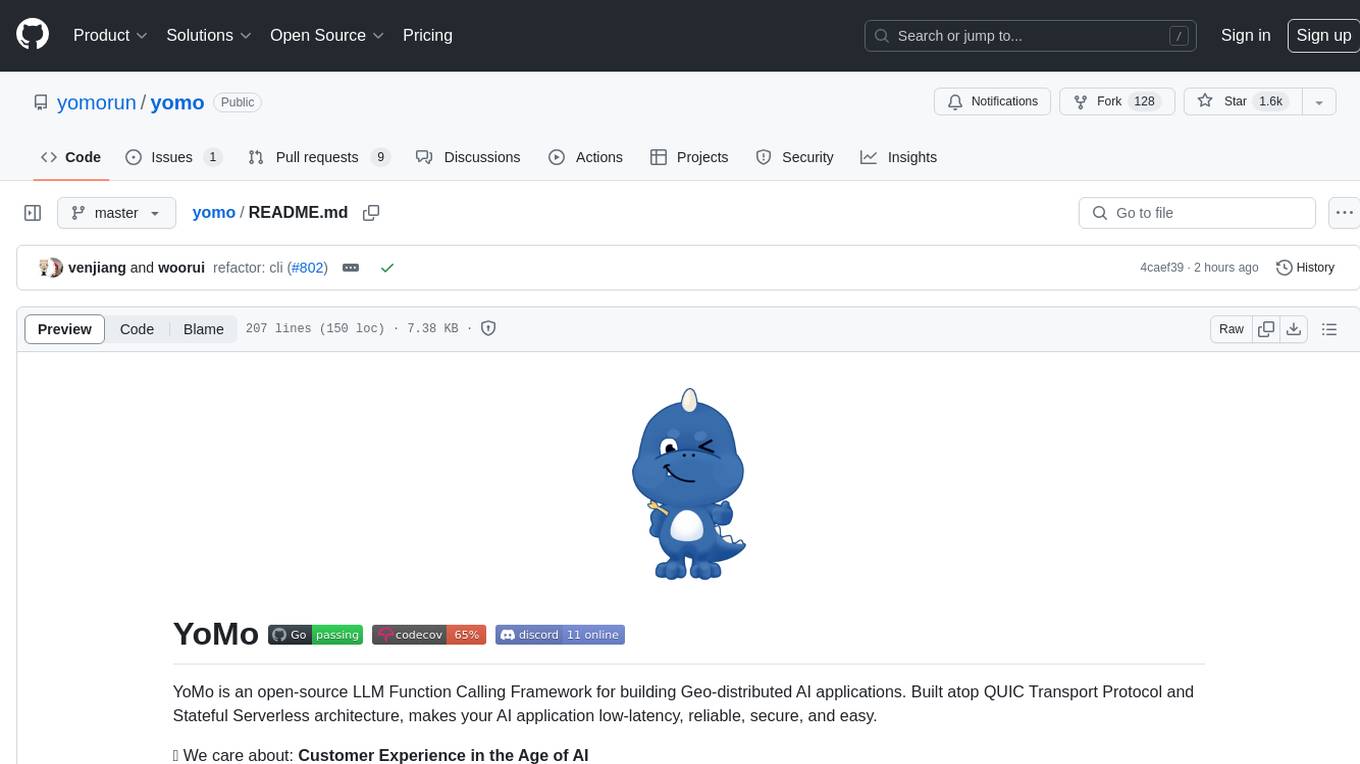
yomo
YoMo is an open-source LLM Function Calling Framework for building Geo-distributed AI applications. It is built atop QUIC Transport Protocol and Stateful Serverless architecture, making AI applications low-latency, reliable, secure, and easy. The framework focuses on providing low-latency, secure, stateful serverless functions that can be distributed geographically to bring AI inference closer to end users. It offers features such as low-latency communication, security with TLS v1.3, stateful serverless functions for faster GPU processing, geo-distributed architecture, and a faster-than-real-time codec called Y3. YoMo enables developers to create and deploy stateful serverless functions for AI inference in a distributed manner, ensuring quick responses to user queries from various locations worldwide.
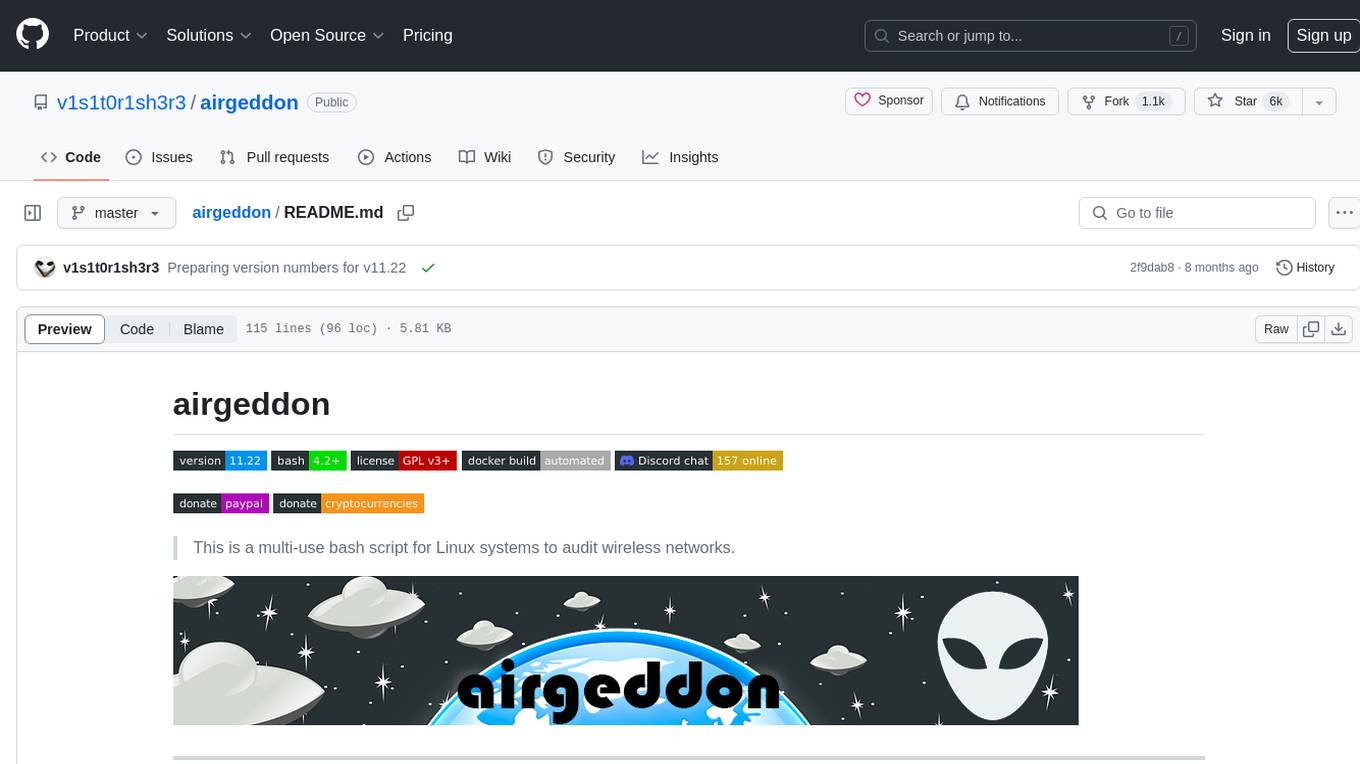
airgeddon
Airgeddon is a versatile bash script designed for Linux systems to conduct wireless network audits. It provides a comprehensive set of features and tools for auditing and securing wireless networks. The script is user-friendly and offers functionalities such as scanning, capturing handshakes, deauth attacks, and more. Airgeddon is regularly updated and supported, making it a valuable tool for both security professionals and enthusiasts.
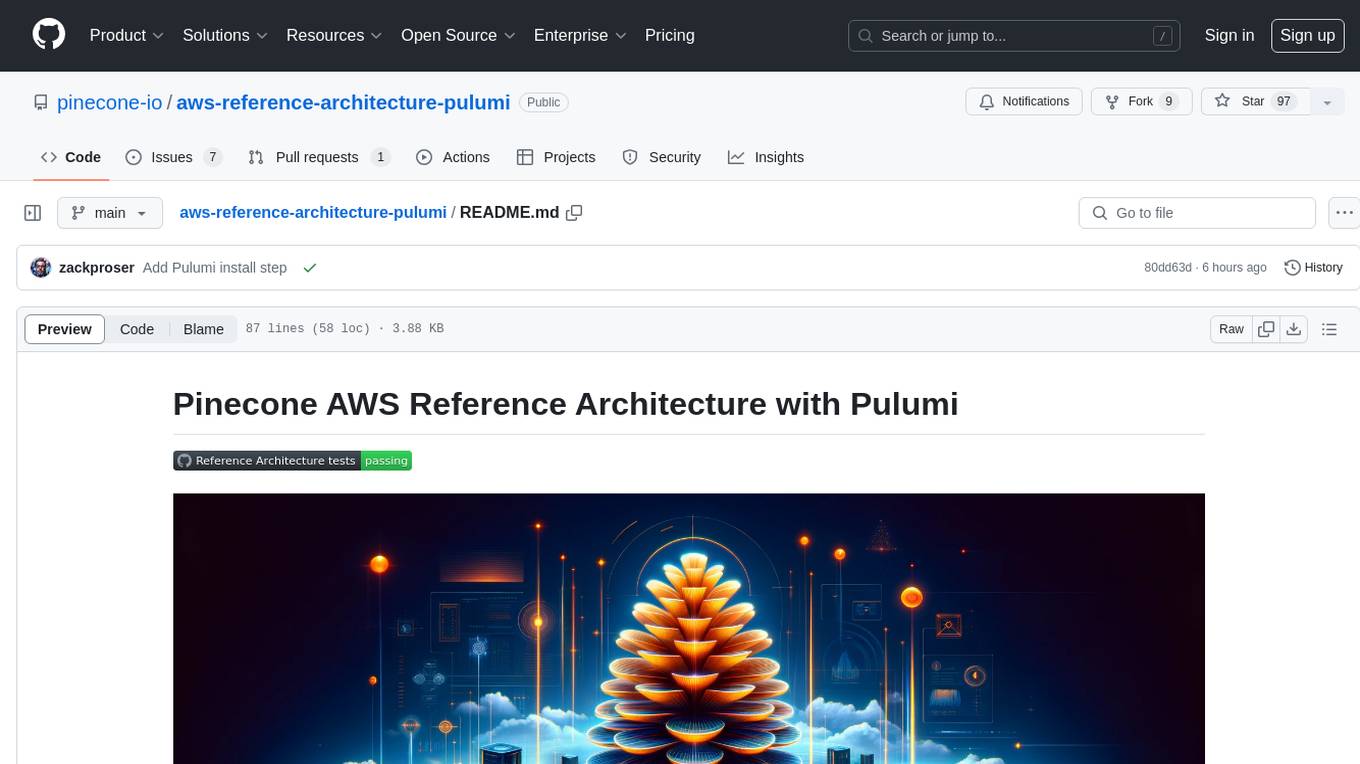
aws-reference-architecture-pulumi
The Pinecone AWS Reference Architecture with Pulumi is a distributed system designed for vector-database-enabled semantic search over Postgres records. It serves as a starting point for specific use cases or as a learning resource. The architecture is permissively licensed and supported by Pinecone's open-source team, facilitating the setup of high-scale use cases for Pinecone's scalable vector database.
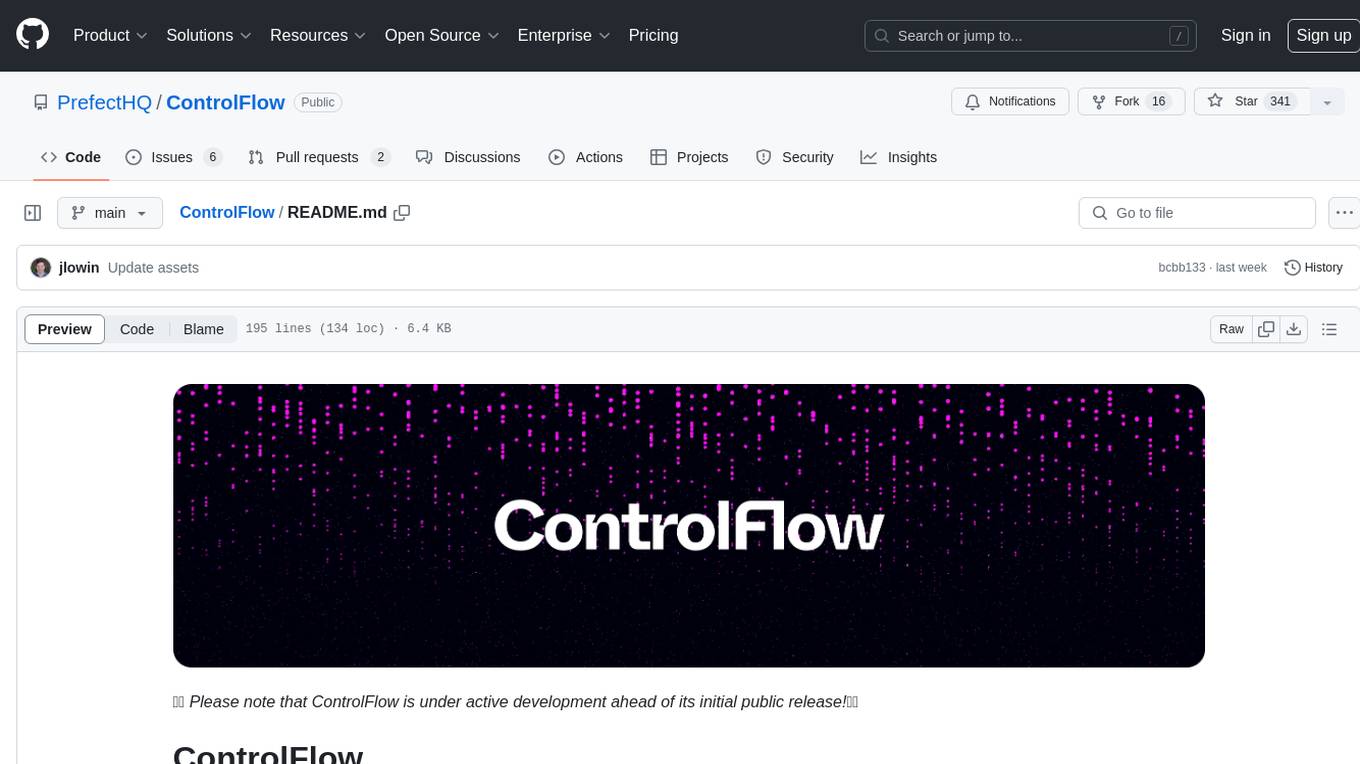
ControlFlow
ControlFlow is a Python framework designed for building agentic AI workflows. It provides a structured approach for defining tasks, assigning specialized AI agents, and orchestrating complex behaviors. By balancing AI autonomy with precise oversight, users can create sophisticated AI-powered applications with confidence. ControlFlow offers a task-centric architecture, structured results with type-safe outputs, specialized agents for efficient problem-solving, ecosystem integration with LangChain models, flexible control over workflows, multi-agent orchestration, and native observability and debugging capabilities.
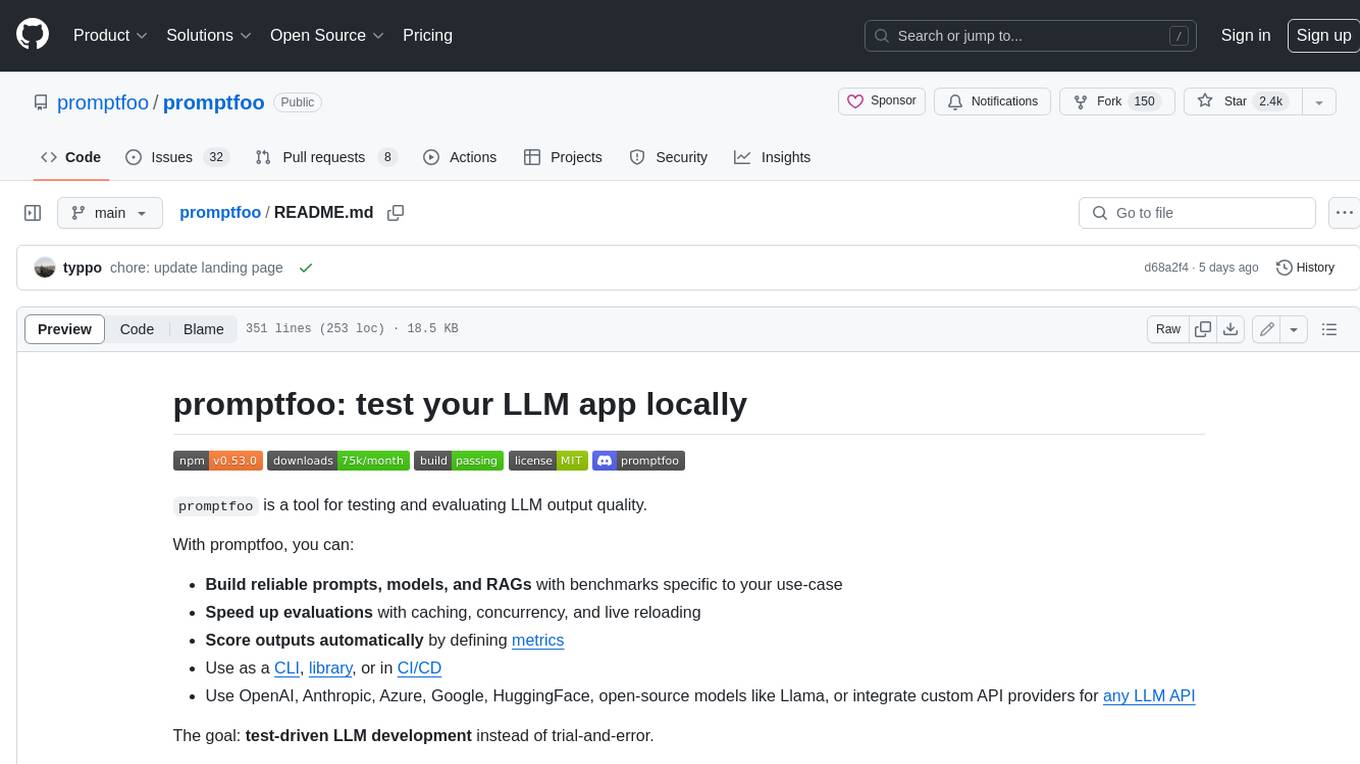
promptfoo
Promptfoo is a tool for testing and evaluating LLM output quality. With promptfoo, you can build reliable prompts, models, and RAGs with benchmarks specific to your use-case, speed up evaluations with caching, concurrency, and live reloading, score outputs automatically by defining metrics, use as a CLI, library, or in CI/CD, and use OpenAI, Anthropic, Azure, Google, HuggingFace, open-source models like Llama, or integrate custom API providers for any LLM API.
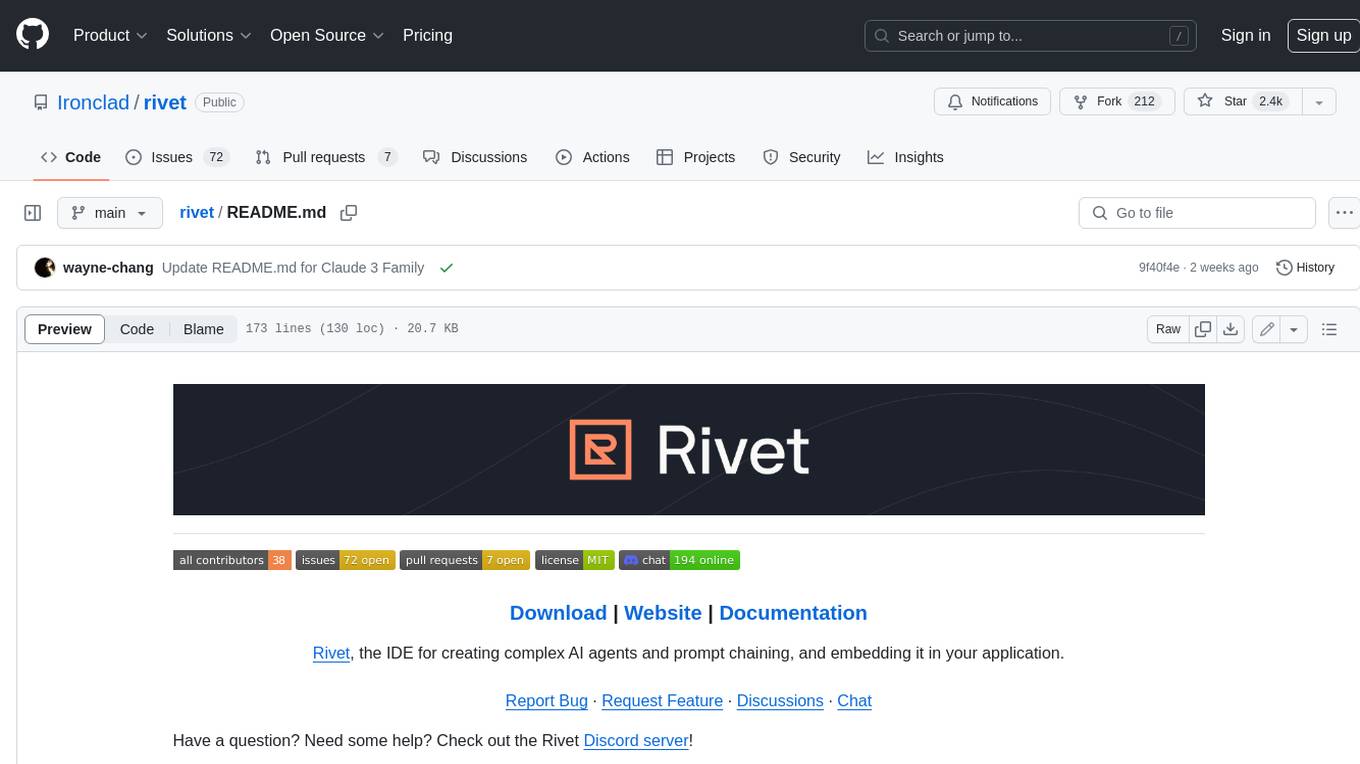
rivet
Rivet is a desktop application for creating complex AI agents and prompt chaining, and embedding it in your application. Rivet currently has LLM support for OpenAI GPT-3.5 and GPT-4, Anthropic Claude Instant and Claude 2, [Anthropic Claude 3 Haiku, Sonnet, and Opus](https://www.anthropic.com/news/claude-3-family), and AssemblyAI LeMUR framework for voice data. Rivet has embedding/vector database support for OpenAI Embeddings and Pinecone. Rivet also supports these additional integrations: Audio Transcription from AssemblyAI. Rivet core is a TypeScript library for running graphs created in Rivet. It is used by the Rivet application, but can also be used in your own applications, so that Rivet can call into your own application's code, and your application can call into Rivet graphs.
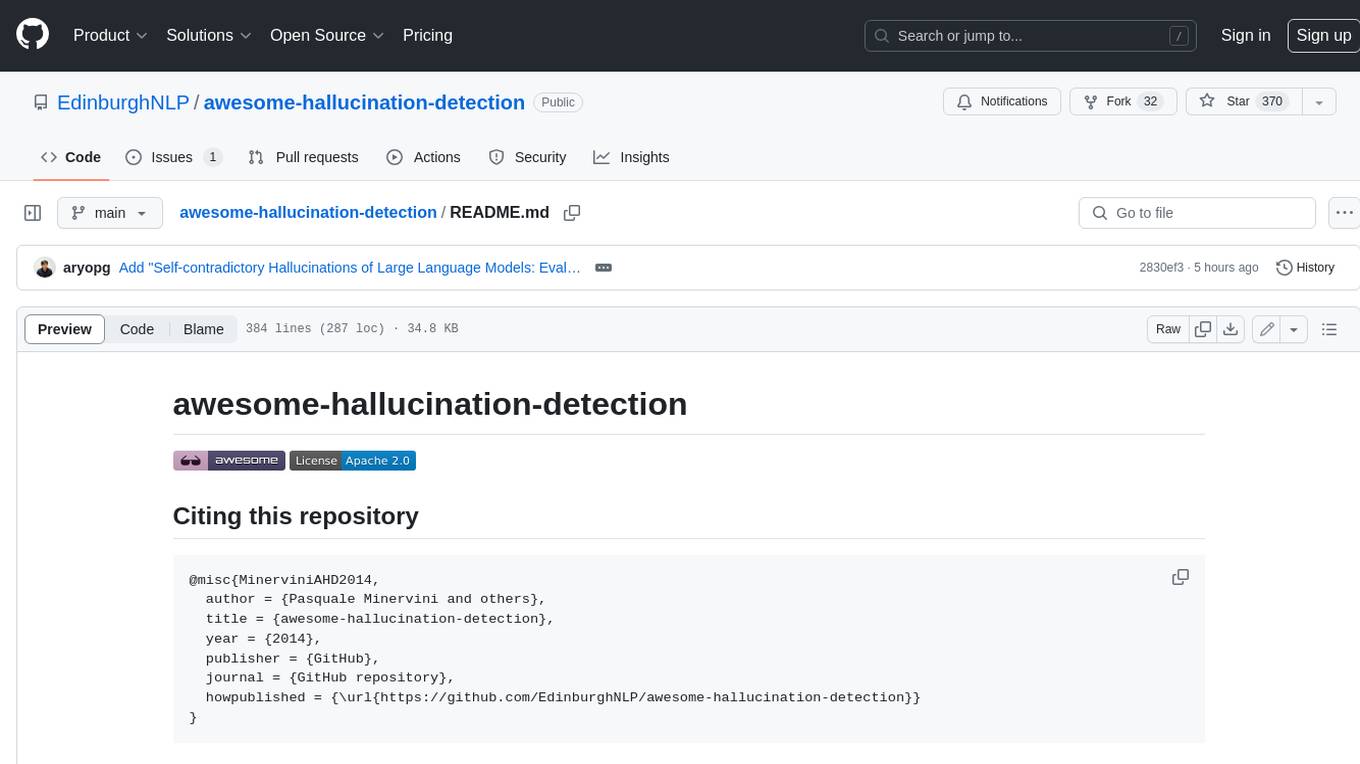
awesome-hallucination-detection
This repository provides a curated list of papers, datasets, and resources related to the detection and mitigation of hallucinations in large language models (LLMs). Hallucinations refer to the generation of factually incorrect or nonsensical text by LLMs, which can be a significant challenge for their use in real-world applications. The resources in this repository aim to help researchers and practitioners better understand and address this issue.
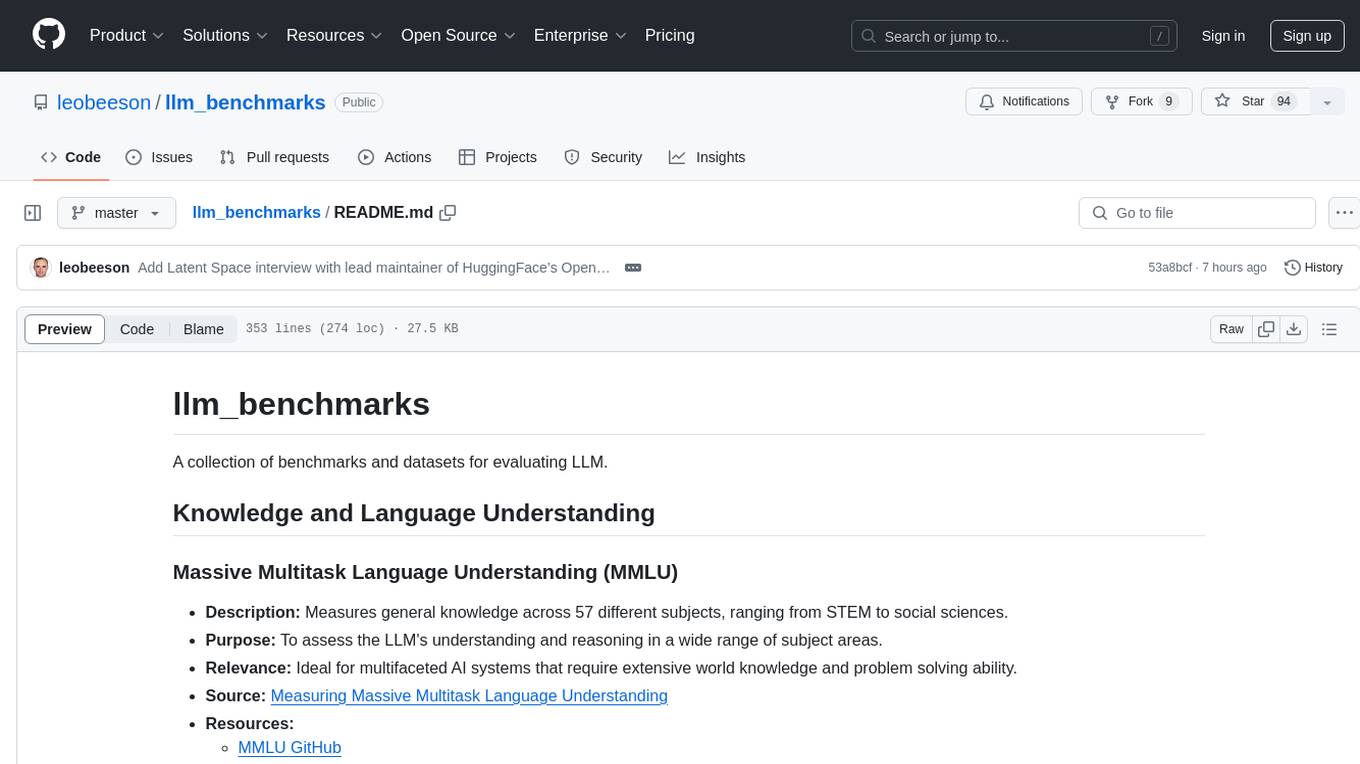
llm_benchmarks
llm_benchmarks is a collection of benchmarks and datasets for evaluating Large Language Models (LLMs). It includes various tasks and datasets to assess LLMs' knowledge, reasoning, language understanding, and conversational abilities. The repository aims to provide comprehensive evaluation resources for LLMs across different domains and applications, such as education, healthcare, content moderation, coding, and conversational AI. Researchers and developers can leverage these benchmarks to test and improve the performance of LLMs in various real-world scenarios.
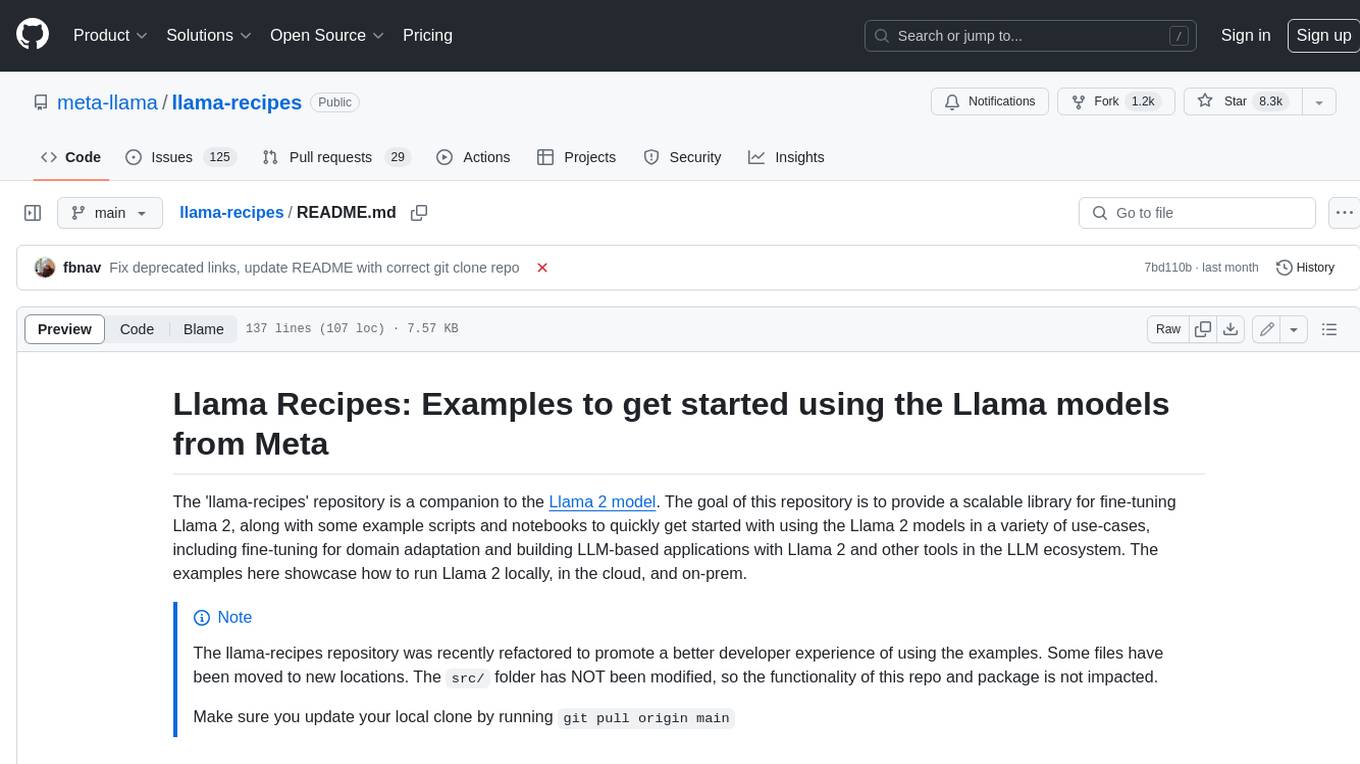
llama-recipes
The llama-recipes repository provides a scalable library for fine-tuning Llama 2, along with example scripts and notebooks to quickly get started with using the Llama 2 models in a variety of use-cases, including fine-tuning for domain adaptation and building LLM-based applications with Llama 2 and other tools in the LLM ecosystem. The examples here showcase how to run Llama 2 locally, in the cloud, and on-prem.
20 - OpenAI Gpts

UX/UI Designer
Crafts intuitive and aesthetically pleasing user interfaces using AI, enhancing the overall user experience.

Don Norman
UX Designer adept in design strategies, UI/UX principles, and technical literacy.

Sandro Morghen GPT
UX Design, UX Architecture & User Research Expert with a focus on collaborative, user-centered methods and achieving business goals.
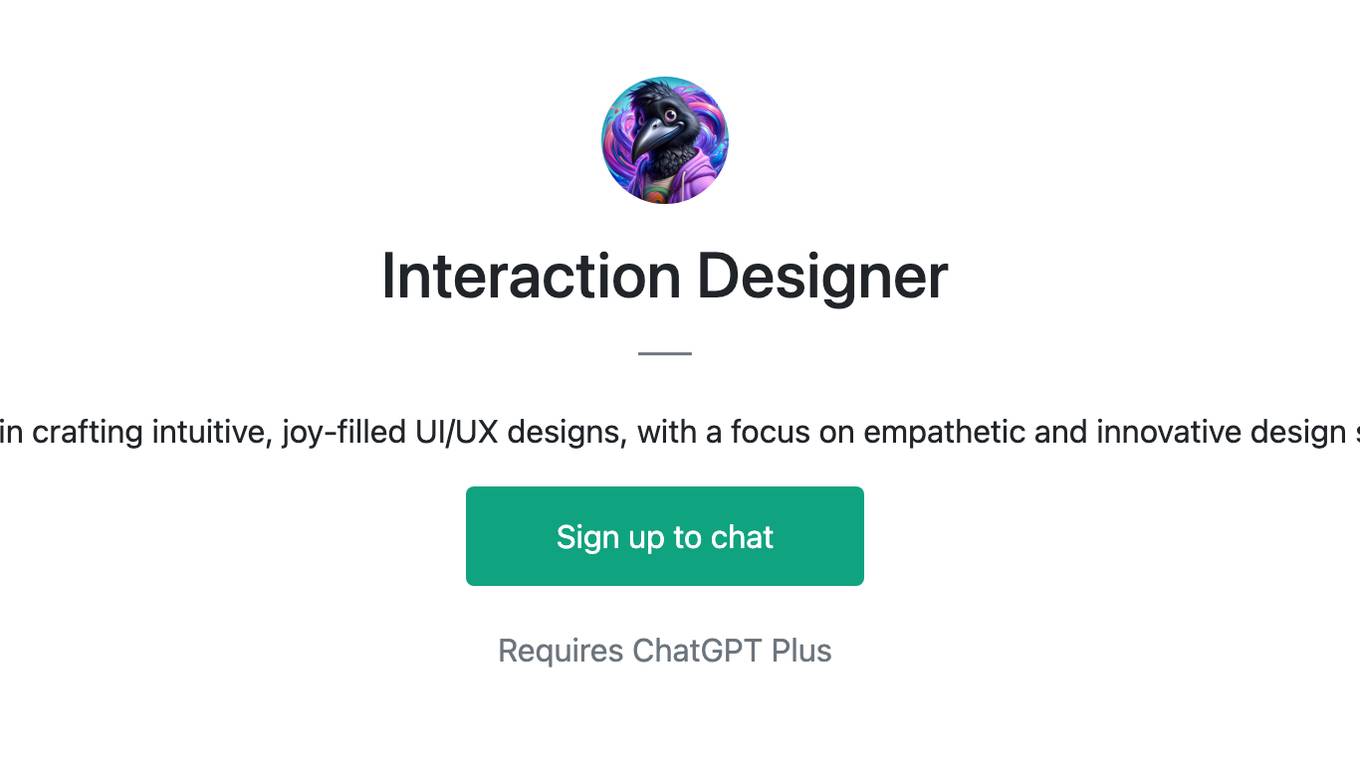
Interaction Designer
Your guide in crafting intuitive, joy-filled UI/UX designs, with a focus on empathetic and innovative design solutions.

Product Improvement Research Advisor
Improves product quality through innovative research and development.

UX Copywriter
Master the art of UX copywriting with expert insights and practical tips. Elevate your user experience through persuasive, user-centric content.

Frida Futurelab
Bilingual CX strategy expert using Futurelab Experience resources. These resources are futurelab.fi website, white papers, blog posts and books by Kari Korkiakoski

Chloé Roux : Designer UX/UI
Conception d'interface utilisateur, expérience utilisateur, design thinking, prototypage rapide, recherche utilisateur.
